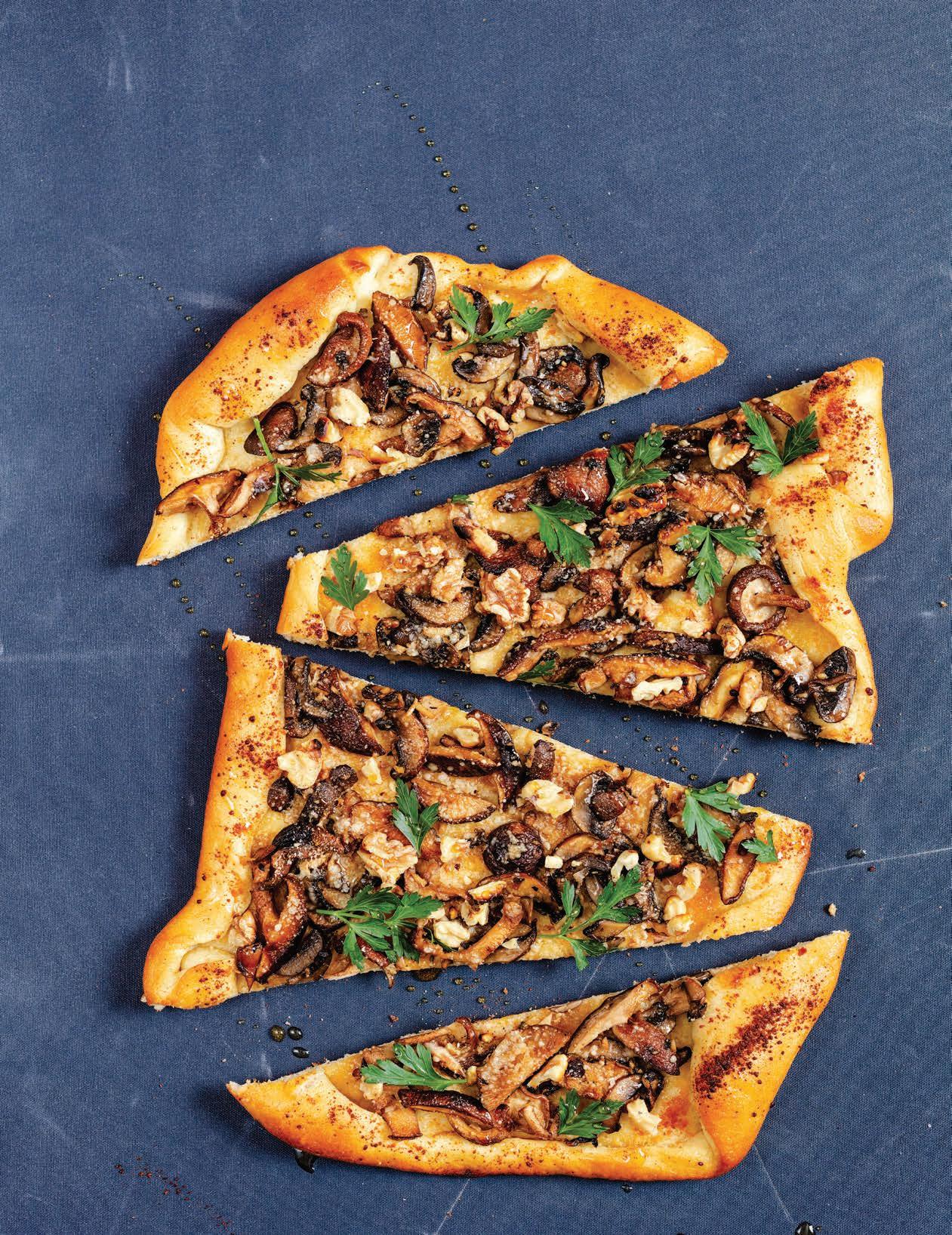




























Face it. Most—or maybe all—of us want to be eating better, particularly as we enter the New Year. It’s a common resolution, but it’s easier said than done.
I came across an interesting article in Psychology Today with research on New Year’s resolutions and what helps people keep them. About 40 percent of people make resolutions, but few stick with them. And of 200 people who made regular resolutions and were studied over two years, only 19 percent reported feeling successful in reaching their goal when researchers touched base with them at the end of the study.
Although this seems like a low number, the study found that people who made resolutions were 10 times more likely to make a positive change after six months versus those who wanted to change but did not commit to a resolution. Researchers also discovered that those who successfully kept their resolutions had slipped or made mistakes while working on their goal during the two years, but then got back on track and persisted.
Particularly when it comes to food, it’s easy to slip into less healthy eating. I’m certainly guilty of it. While I pride myself on eating well—buying lots of fruits and veggies, planning healthy weekly menus, eating mainly plant-based—I have my vices (potato chips and almost anything sweet!). I was recently introduced to an app that helps keep me in check on the foods I buy: It’s called OptUP.
Created by a team of health, nutrition, data and tech experts at Kroger (the parent company of Fred Meyer), the app puts nutritional information for all items available at Fred Meyer stores at your fingertips with a nutritional score from 1 to 100, and a green (71+ score), yellow (36–70) or red (1–35) distinction. Foods with more protein and fiber (such as fruits, veggies and nut-based items) rate higher, while products higher in calories, saturated fat, salt and sugar score lower.
To start using OptUP, simply enter your
shopper-card number, and every time you shop, you’ll get an overall score of your purchases—600 or better is ideal for each shopping trip—plus a breakdown of items by color category and nutritional score. For example, a bunch of raw spinach has a green score of 90, while a bag of Boulder Canyon potato chips is a yellow score of 40 and a Twix bar is a measly red score of 4. Kroger dietitians recommend a cart mix with at least 50 percent green-category products.
A fun feature is the ability to scan products with your smartphone while shopping to view nutritional info, as well as a list of better-for-you options. Instead of a Twix bar, for example, the app suggests Ghirardelli (yellow score of 42) or Hershey’s dark chocolate (yellow score of 52) bars. So, I don’t have to give up my chocolate!
As you enter this New Year with a goal of eating better, consider giving the OptUP app a try. It might be just the tool you need to help you shop with health in mind.

 Rebecca Heaton, Editor editor@livenaturallymagazine.com
Rebecca Heaton, Editor editor@livenaturallymagazine.com
BEGIN
The Science of Epigenetics
PLUS Smart grocery shopping tips, a new nutrition app, fighting food waste and the power of intention.
PANTRY
Dairy and Dairy-Free Yogurts

PLUS All about ghee, and the growing variety of plant-based food options.
KITCHEN
Oh, Oatmeal
PLUS The scoop on seaweed, new cookbooks, cool kitchen gadgets and creative coffee add-ins.

These good-for-you organisms are major players in gut health and overall well-being.
 BY SOPHIA MCDONALD
BY SOPHIA MCDONALD
EAT
Dish It Up
’Tis the season for warm, hearty, satisfying meals, courtesy of the budding chefs at Johnson & Wales University.
Fast & Flavorful
Healthy pizzas for a variety of palates, including one pie that’s gluten-free.
BY GENEVIEVE DOLLHealthy Kitchen
Low-carb, high-fat recipes that adhere to the popular ketogenic diet.
BY TAFFINY ELRODAround the World
Colorful spices and tongue-tingling flavors are the crux of Indian cuisine.
BY REBECCA TREONBOOST
Moringa
Rich in vitamins, minerals and amino acids, moringa is nutrient-packed.
BY KELLEE KATAGIMetabolism Boosters
Natural ways to stimulate your body’s fuel-burning capabilities.
BY NANCY COULTER-PARKERCollagen
The research keeps coming on the multitude of benefits.
BY KELLEE KATAGITRY
Savory Persimmon
Hand Pies
This “fruit of the gods” is nice savory or sweet.
BY DINA DELEASA-GONSARrecipe index
Baked Veggie Egg Rolls with Sweet and Sour Sauce 38
Beet Tempeh Tostada with Vegan Chipotle Aioli 38
Broccoli, Fennel and Mozzarella Pizza 44
Brussels Sprouts and Watercress Salad 38
Citrus-Herb Shrimp Sauté 47
Dark Chocolate Panna Cotta with Raspberry Sauce 50
Herbed-Gruyère
Scrambled Eggs with Easy Almond-Flour Biscuits 48
Mango Marmalade 53
Mushrooms, Toasted Walnuts and Parsley
Pizza 43
Pesto, Turkey Sausage, Feta and Pomegranate Pizza 42
Polenta Crust Pizza with Bacon, Sautéed Red Onions and Arugula 41
Savory Persimmon
Hand Pies 64
Sweet Potato and Barley Congee 38
Tarragon Chicken and Wild Mushroom Bisque 49








Part of the Live Naturally family of Kroger magazines
WINTER 2019
livenaturallymagazine.com
VICE PRESIDENT & GROUP PUBLISHER
Deborah Juris EDITOR
Rebecca Heaton
ART DIRECTOR
Lindsay Burke
DESIGNER/DIGITAL
Shannon Moore
ASSISTANT EDITOR
Kellee Katagi
DIGITAL EDITOR
Lauren Yeates
DIGITAL PRODUCTION ASSISTANT
Ashley McLeod
COPY EDITOR
Julie Van Keuren
MARKETING OPERATIONS MANAGER
Susan Humphrey
CONTRIBUTING WRITERS
Lisa Beach, Nancy Coulter-Parker, Dina Deleasa-Gonsar, Genevieve Doll, Taffiny Elrod, Kimberly Lord Stewart, Kellee Katagi, Kathryn Leavitt, Sophia McDonald, Kara Nielsen, James Rouse

CONTRIBUTING ARTIST AND STYLISTS

Aaron Colussi, Eric Leskovar, Nicole Dominic

ADVERTISING SALES
Deborah Juris, Tracy McIlroy
PUBLISHED BY
NO PURCHASE OR PAYMENT NECESSARY. The Sweepstakes begins at 12:00 A.M. MST on December 26, 2018 and ends at 11:59 P.M. MST on April 14, 2019. A random drawing for five (5) potential winners will take place on April 15, 2019. The Prize Winners will be notified by email on or about April 15, 2019. Winners required to respond by April 22, 2019, or will new winner will be redrawn. Winners will be posted online at livenaturallymagazine.com/winners-2019 and will be printed in the Summer 2019 issue. Must be 18 years of age or older and a legal resident of the USA to participate. All federal, state and local laws and regulations apply. For a final list of Winners and complete Official Rules, please visit livenaturallymagazine.com/rules-regs. For the private policy visit livenaturallymagazine.com/privacy-policy.
www.hungryeyemedia.com 800.852.0857

PRESIDENT
Brendan Harrington
Free of MSG, gluten, sugar, binders and llers, Jones all-natural sausage is a better way to start your day. Made from just ve ingredients for 129 years, it tastes so good that Philip Jones, 6th generation President, personally guarantees it. Protein packed and an ideal t for Keto, Whole30® or Paleo diets, you’re going to love this sausage. That’s what it means to Breakfast Better with Jones.













Try some today! Available in the freezer section.






when you take a closer look at your genetics, blood and biome to get a better picture of who you are, you are better able to select particular recommendations to improve your health and longevity.
How can people learn about the current status of their genes?
In his new book, Dr. Kenneth Pelletier introduces an emerging science that examines how our genes are shaped by what we think and do.
BY REBECCA HEATONKenneth R. Pelletier, Ph.D., M.D., is a pioneer of integrative medicine and has authored numerous books, including the international best seller Mind as Healer, Mind as Slayer (Dell, 1977). In his latest, Change Your Genes, Change Your Life (Origin, 2018), Pelletier explores epigenetics, the science of lifestyle medicine. Epigenetics asserts that genetics and DNA don’t rigidly govern our health and longevity; rather, we have the ability to compensate for our genetic vulnerabilities by switching genes on or off through our daily activities.

Most medical professionals think of genetics as the hard drive in a computer; it gives commands to your genes. Epigenetics is above, beyond and over the gene. I like to describe it as an artificial intelligence, not a hard drive. It’s a newly evolving science of the understanding of how we interact with our genes and how lifestyle biomarkers—for example, diet, stress, pharmacology and environment—can influence the expression of a gene for optimal health and longevity. My hope with this book is that individuals will realize we are not victims of our genetic code; we are, in fact, masters of our fate.
You use the analogy of a theatrical script to illustrate how epigenetic regulation (influencing our genes) works. Please explain. The gene is like Shakespeare’s play Hamlet: the plot, the play, the writing…that is invariant. But a gene’s expression is governed by what we do every day. Hamlet has been performed by numerous actors, which makes each version of the play different. The underlying script never changes, but the expression does. A gene is fixed, but its expression and epigenetic modifications are like a play that comes out looking different each time, though the script is the same. The human body has the ability to
reprogram its genetic expression through lifestyle choices, and we are opening the door to a new era of personalized medicine.
Please further explain “personalized medicine.” How does it tie with our ability to influence our genes for the better?
In today’s world, we are bombarded by contradictory recommendations for diets— low-fat, ketogenic, paleo—how to manage stress, and prescriptions for exercise and training. We are given all these directives about health, but we don’t know our own genetic makeup and whether any of these would be a good match. With personalized medicine,
Several companies do various forms of gene analysis via blood test. The problem today is that results are statistical, meaning you could have an 80 percent chance of IBS, a 60 percent chance of heart disease. But this doesn’t tell you much, because statistics mean probabilities, not you. The more interesting question is who doesn’t have these issues? Within the next year or two, there will be an assay for your gene, blood and biome, which will provide a predictive, accurate personalized medicine profile.
What are three things our readers could work on to change their genetic expression for the better?
First, consume a Mediterranean diet, with an emphasis on fish, fresh vegetables, fruits, olive oil, moderate alcohol consumption (especially red wine) and healthy fats. Second, develop a meditation and/or stress-management practice. It can be as little as 3 to 15 minutes per day; regular practice makes the difference.

Third, increase daily physical activity. It can be walking, gardening, yoga or any other regular, fun activity that keeps you moving and flexible.

Red Duck Foods, a Certified B Corporation that makes better-for-you condiments, has grown a great deal since its humble beginnings as a graduate-studies project at the University of Oregon. Co-founders Jessica Hilbert, Shannon Oliver and Karen Bonner were tasked with creating a plan for a company and testing it out. Their inspiration? Noticing how much care and preparation went into the food they ate but how “junky” the complementary condiments were. “Why,” asked Hilbert, “would you put an inferior sauce on a superior meal?” From this question, a company was born.
The women crafted three original flavors of ketchup (which they still make today) to be eaten with fries for the final presentation. “We haven’t looked back,” Hilbert says.
Portland-based Red Duck Foods now distributes 11 products in more than 5,000 stores, both in the U.S. and internationally. Despite their success, the founders have never wavered from their goal to deliver delicious condiments made from organic ingredients, which now include barbecue, cocktail and taco sauces.


This drive to use only healthy ingredients led to Red Duck Foods becoming a B Corp (a business that balances profit and purpose) almost a year ago. And despite their multinational status, Red Duck Foods keeps a local focus as well. Each employee gets four paid days off per year to put toward volunteering. In addition, the company prepares holiday meals at the Oregon Food Bank and donates products to victims of natural disasters, “because sometimes a kick of ketchup on an otherwise bland meal can make you feel like you’re in a less cruddy situation,” Hilbert explains.
Brew Dr. Kombucha’s mission: to craft a beverage that benefits the body—and taste buds—of every person who drinks it. By using only all-natural ingredients and a unique brewing process that preserves the flavor and gut-healthy nutrition of the drink while being environmentally conscious, Brew Dr. Kombucha, based in Portland, creates more than a dozen tasty and good-for-you flavors.
The company also partners with nonprofits to bring their product into college environments, where students typically drink not-so-healthy sodas and energy drinks. As founder and CEO Matt Thomas explains: “Being healthy is not fixing problems when they arise—it’s being proactive and living a healthy lifestyle.”
Look for Brew Dr.’s new Vanilla Oak Kombucha in a 12-ounce bottle—it’s sure to brighten your winter days and perhaps bolster your immune system, too. –S.K.

Think beyond apple pie and applesauce, and get creative this winter with new and tasty recipes using delicious apples from Northwest favorite Rainier Fruit. Visit rainierfruit. com/all-recipes/applerecipes for one of our faves— Savory Stuffed Apples—which is sure to leave you satisfied, and, well, stuffed!

The numbers are staggering: 40 percent of all food produced in the U.S. is thrown away, half of which happens at home. Meanwhile, one in seven Americans is food insecure, meaning they either don’t have enough to eat or don’t know where their next meal is coming from. So, what can we do to change this? Take it one step at a time.

PLAN. .
Start with a three-day menu plan, and add to it as you go. Most people, without knowing it, rotate through only a few different meals. Plan for leftovers, and have a clean-out-the-fridge dinner once a week.
BUY SMART. .
Purchase only what you will use—that bulk bargain deal is only worth it if you are able to use the food before it spoils. Don’t be afraid of the “uglies:” Produce doesn’t have to be picture-perfect to be delicious, and you can often save money, too.
PREP. .
Here are a few ideas, courtesy of Phoenixbased chef Omei Eaglerider, to get you started on the path of wasting less food and being a food hero.
Stock your pantry, and keep an ongoing inventory. Do your food prep right after shopping: Wash, dry, chop, dice, slice and portion into storage containers. It will make cooking that much easier during the week.
We often toss out parts of our food that are edible, nutritious and tasty. Think “root to stem” and “nose to tail” cooking; leave skin on produce, use tops and greens in salads or sauces, and save bones and scraps for broth.
STORE. . Keep your pantry, fridge and freezer organized. Check your refrigerator and cupboards before shopping to avoid buying food you already have.

Many fruits give off natural gases as they ripen, making other nearby produce spoil faster.
HERE ARE THE BEST PLACES TO STORE
Store in the fridge
Almost all vegetables and herbs; berries, cherries, grapes, kiwis, lemons, oranges

You likely know the upsides of composting—how it transforms food waste into a soil-enriching substance that nurtures plants—but perhaps you can’t get past the thought of stinky scraps sitting around. If so, EcoCrock by Chef’n may be your answer. This compact countertop bin includes a charcoal filter that squelches odors, plus a removable inner bucket that makes it easy to transfer food scraps from the bucket to an outdoor pile or bin with minimal mess. $39.99
Store bananas, apples and tomatoes by themselves. And store items in the right place. See tips at right.
Extend the life of your produce by preserving any surplus. A few simple methods are freezing, pickling or dehydrating.
Still can’t eat it all up? Try composting.
Store on counter, and refrigerate once ripe
Melons, nectarines, apricots, peaches, plums, avocados, pears, tomatoes
Store at room temp
Basil and winter squashes (once cut, store squashes in fridge)
Healthful and sustainable seafood meals and snacks are now more accessible.

Did you know that the American Heart Association recommends eating fish twice a week? The goal is to increase Americans’ intake of nutritious omega-3 fatty acids, which promote heart health. Fish is also a good source of protein and is low in carbs. What keeps us from our two servings a week, just seven ounces in all? Mostly, easy access.
That’s changing, thanks to an exciting trend in seafood meals and snacks. If you haven’t peeked at the frozen-fish section lately, you may not have noticed the influx of new packaged fish fillets and fish-based meals. Out are breaded and fried fish and in are on-trend crusts made from nuts, spices and herbs; parchment paper or foil wrappers for oven-roasting; and readyto-heat sauces.
Sea Cuisine has a range of fish—rockfish, salmon, cod—ready to cook, with crusts of potato, tortilla chips and seasoned panko. Love the Wild offers sustainably sourced farmed fish with adorable heart-shaped sauce cubes to accompany barramundi or red trout fillets, ready to wrap in parchment and pop in the oven; sauce flavors include Salsa Verde and Mango Sriracha Chutney.
Prepared frozen meals featuring fish are another up-to-date selection. Saffron Road Thai Red Curry Fish includes chunks of wild Alaskan pollock, a sustainable, mild white fish that is also
the base of Lean Cuisine Marketplace Tortilla Crusted Fish on rice with poblano chiles, corn and sour-cream sauce. Gorton’s Shrimp Bowl comes on a bed of Japanese soba noodles. Precut tuna for homemade poke bowls is another discovery, although ready-to-eat bowls from Blue Hill Bay with smoked ahi or salmon provide an immediate poke fix.
If cooking isn’t an option, then seafood snacks may be the answer. Patagonia Provisions, a food line from the clothing company, has packaged seafood for campers or anyone seeking portable protein. Tins of flavored mussels and pouches of seasoned salmon bites raise the bar for trail snacks. More accessible still is salmon jerky, seasoned with black pepper, herbs or citrus. On the horizon are crunchy snack chips made from salmon skin, a resourceful and nutritious application for that part of the fish.
For desk lunch enhancement, StarKist and Bumble Bee have seasoned tuna pouch meals. StarKist Charlie’s Snack Kit has all the components needed to mix a fresh batch of tuna salad, including a cup, spoon, reduced-fat mayo, relish and crackers. At 19 grams of protein, it’s a full meal. For flavor lovers, StarKist Creations’ new BOLD line pouched tuna features crowd-favorite Tapatio and Sriracha. Altogether, it’s easier than ever to hit—or even surpass—our fish Rx for the week.
When stress is dragging you down, a literal gut check might be the remedy. Specifically, a recent double-blind study published in Clinical Nutrition found that adults who took daily doses of a certain probiotic strain—Lactobacillus plantarum P8—over 12 weeks reduced their stress and anxiety levels, compared with participants who took a placebo. They also experienced lower levels of pro-inflammatory markers and received some immediate cognitive benefits, such as improved memory (especially for men).

The study showed no effect, however, for depression symptoms.
Kellee KatagiFOR MORE BENEFITS OF PROBIOTICS, TURN TO PAGE 54.
A growing number of companies are on trend, instilling sustainability initiatives as part of their best business practices. We recognize two:
ALPHA FOODS
Committed to using clean, quality ingredients, reducing meat consumption and encouraging plant-based eating to reduce harmful emissions from livestock.
PURE BLENDS
Driving change through their Sustainable Palm Oil Policy, committed to 100 percent traceability for all crude palm oil used in products.

Did you know that Fred Meyer has a new app to help you make better food choices when you shop? It’s called OptUP. Download on the App Store or Google Play.


MANUFACTURER COUPONEXPIRES 06-30-2019
on any 2 flavors of BREW DR. KOMBUCHA (12 oz bottles any flavor)
Available in select stores.
Consumer: Redeem only by purchasing the brand and size(s) indicated. May not be reproduced. Void if transferred to any person, firm, or group prior to store redemption. Any other use constitutes fraud. Consumer pays sales tax. Discount may not be combined with any other offer. No cashback. LIMIT TWO COUPONS PER PURCHASE.
RETAILER: Brew Dr. Kombucha will reimburse you the face value of this coupon plus 8 cents handling in accordance with our redemption policy (copy available upon request). Consumer must pay any sales tax. Send all redeemed coupons to Brew Dr. Kombucha Mandlik & Rhodes, PO Box 490, Dept #1452, Tecate, CA 91980. Failure to produce invoices on request providing purchase of stock covering coupons may void all coupons submitted. Void if copied, reproduced, altered, transferred, sold or exchanged.
Cash value: 1/100¢.
Retailer: Brew Dr. Kombucha will reimburse you face value (up to $0.75)




© 2018 Brew Dr. Kombucha, All Rights Reserved.
0851107003-012523



“Grocery shopping doesn’t have to suck,” says Maria Marlowe, author of The Real Food Grocery Guide . “There are easy ways to work through the jungle that is a grocery store."

Nutritionists reveal 5 tips for smarter grocery shopping.
BY LISA A. BEACHAs a savvy grocery shopper, you already follow basic food-buying rules, such as don’t shop hungry. But navigating the food aisles has become a tricky task for health-conscious consumers. Knowing that healthy eating starts with smarter grocery shopping, we asked nutritionists for their insights.
“You don’t have to buy everything organic,” says integrative nutritionist Maria Marlowe, author of The Real Food Grocery Guide (Fair Winds, 2017). “To choose which ones to buy organic, look at the Environmental Working Group’s annual Dirty Dozen list to see produce with the highest levels of pesticides.” (Find the list at ewg.org.)
“That’s where supermarkets typically stock real foods—the healthy ones you have to cook or prepare yourself,” says Marion Nestle, Ph.D., professor emerita of Nutrition, Food Studies and Public Health at New York University and author of What to Eat (North Point, 2006).
They’re just as healthy as fresh and a great option in winter. Make sure only whole foods are on the ingredient list and that they were picked at peak ripeness. “They lose very little nutritional value in freezing,” Nestle says. Marlowe adds, “Frozen produce is 25 percent cheaper.”
To save money when buying from the bulk section (think beans, rice and grains), get only what you’ll need in the short term. “If you use something regularly, buy in small amounts weekly to ensure freshness,”
Marlowe notes. Nuts, for example, go rancid quickly, and beans start to change in color and taste as they age.
To figure out if a packaged food is healthy, read the ingredient list. “Choose foods that have ingredients you’d stock in your own kitchen,” advises Marlowe. This differs from the advice to avoid ingredients you can’t pronounce. Marlowe notes that you can pronounce red dye #5 and high-fructose corn syrup—unhealthy ingredients that you wouldn’t stock in your pantry.
It’s a powerful habit to develop: intention. Over the past 10 to 15 years, people on both sides—spiritual and scientific—have come to agree that when people recognize the benefits of setting and following through on intentions, their attitude, health and well-being improve.
Here’s a great example. A large hotel chain conducted a study of several hundred housekeepers as part of a “help initiative.” When the group was polled, the number-one complaint was that there wasn’t enough time to exercise, so they were gaining weight and experiencing lackluster energy levels. Study researchers decided to track a select group of participants to see how many calories
BY DR. JAMES ROUSEthey were burning while going through various cleaning tasks. The result: The workers were burning hundreds of calories daily. And once the workers were told this and that they should be proud of their activity level, they reported a better mood and began to lose weight—all because researchers planted a seed of intention and pointed out that the physical work was actually delivering positive benefits.
This is the power of intention: the power of how we can go out and create what we’re looking for. But sometimes it’s something good that we’re already doing. And when we recognize that, the results are beautiful.
When I see patients, I say, “Tell me all
of the things that you’re doing great at right now.” Often there is a pause, but then they begin to open their mind to things that are positive, such as “I got out and walked three times this week” or “I always try to turn my computer off by 7 p.m.” When they listen to themselves acknowledging their actions, they become more intentional about following through on those actions. I’ve seen patients’ body language and mood change, and amazing life transformations happen over periods of time.
In our present times, it’s easy to lose ourselves and not find a space of grace in all of the good we do. Here are five simple ways to be more intentional every day.

When you come home from work, feel free to be intentional about leaving the day and its possible stressors and challenges behind by taking a lap around the neighborhood, around your house or even around your car.

When you’re with a loved one, make sincere and ever-present eye contact to be more intentional about increasing compassion, empathy and common humanity.

First thing in the morning, be more intentional about lowering stress by connecting with yourself, your heart and your loved ones, rather than beginning your day with media.
To be intentional about increasing your chances of sleeping well, eating better, lowering stress and increasing your likelihood of success, write down five things you’re grateful for before going to bed.
Shut your phone off an hour before bedtime, with the intention of getting a better night’s sleep.
It seems that everyone is looking for the perfect diet. How do nutrigenomics and culinary genomics reduce the confusion?
The most important thing is that nutrigenomics and its kitchen companion, culinary genomics, are not part of a single diet or weight-loss plan. Together, they represent a new way of thinking about how we choose, prepare and understand ingredients to optimize long-term health.
Our genes don’t lie. The most precise insights into how and what each of us should eat is derived from our genomic blueprint. Each of us has a complete set of DNA called our genome, which determines who we are. Genomics is the study of genes and their functions in the body. Genes produce proteins that essentially direct your health through their many functions.

Nutrigenomics tells us precisely how the food we eat interacts with specific genes, turning them on or off, for example. For instance, we know which genes induce inflammation when they are activated; nutrigenomics tells us the foods with the opposite effect—turning these same genes down or off. In other words, you are choosing foods not based on “healthy” or “good for you,” rather on the basis of how these foods affect your body. Nutrigenomics allows us to look beyond generalized guidelines to more precise ways of shopping for and preparing foods based on how the foods influence specific genes.
Genetic tests are cheek swabs; no blood work is needed. Prices vary from a few hundred dollars to more than $1,000, depending on how many genes are being tested. Expect to pay about $1,200 for a whole-body wellness screening that looks at the body’s primary systems. A test on a single body system, such as cardiovascular health, will cost much less.
There’s nothing more unique to you than your DNA. So it makes sense that choosing foods that gel with your personal genetic code would be a smart way to eat. This approach—called nutrigenomics or culinary genomics—shifts dietary recommendations from a macro perspective to one that focuses on you, the individual. Amanda Archibald, R.D., founder of The Genomic Kitchen, explains how these fascinating disciplines are changing the knowledge base of what we should eat and why.
To complete the circuit, culinary genomics is literally preparing and cooking foods that talk to your genes. It is cooking for the language of your DNA to ensure that foods retain the nutrients and information our body and genes need to function efficiently.
In short, the answer is no. The beauty of nutrigenomics is that the science applies to us all. For instance, we know how to turn on genes that produce antioxidants to quench troublesome free radicals. How? When the body is under stress, bioactives (most frequently found in vegetables, fruit, herbs and spices) initiate the process of activating genes whose products are powerful
antioxidant enzymes. Those foods work the same way for you as they do for me. A gene is a gene. What differentiates us is how much of that food is needed. Those differences have to do with gene variants, and that’s what genomic testing pinpoints. That being said, if you want the most precise understanding of which foods will optimize your genes, then a genomic test is recommended. Be cautious, though; there are lots of testing companies, but there are fewer trained clinicians to accurately interpret and apply personalized genomic information to everyone.
The answer is an emphatic “yes”! I talked about turning on a gene that helps the body produce antioxidants, which combat unstable free radicals that are harmful when their numbers get out of control. Most of us are familiar with antioxidants from food, such as vitamins A or C. Although these vitamins help manage free radicals, we have a far more powerful antioxidant tool in the body called the Nrf2 pathway, a transcription factor (a protein
Here’s a culinary genomic technique to get foods talking to your genes fast. In cruciferous vegetables, the bioactive sulforaphane does not occur naturally; it has to be created. You create sulforaphane by cutting, slicing or chopping the veggies, which causes a chemical reaction. If steaming or quick sautéing vegetables, prep them ahead of time and let them sit for 60 minutes. This allows the sulforaphane to form and withstand the heat of cooking. For raw salads, chop and use right away.
that converts DNA into RNA) that is produced by a gene called NFE2L2. When Nrf2 is activated, it produces powerful antioxidants that I call firehoses. Food turns on that Nrf2-firehose pathway.



This is where anyone can become a savvy culinary genomic shopper and cook. Nrf2 is activated by bioactives, non-nutrient compounds that send a signal to Nrf2 to get to work. Nutrigenomics tells us which foods contain bioactives. Culinary genomics tells us how to prepare and cook those foods to get the most bioactives. Some Nrf2-friendly foods:
Cruciferous vegetables like broccoli, brussels sprouts, radishes, cauliflower and turnips contain the bioactive sulforaphane, which talks loudly to Nrf2.
Onions, leeks and shallots contain the bioactive quercetin, which activates Nrf2 and can also turn down the impact of other inflammation-causing genes.
Herbs and spices also speak the language of Nrf2 and quercetin. Look for fresh herbs such as basil, oregano, parsley, rosemary, sage and thyme.
 BY DR. DEBRA ROUSE
BY DR. DEBRA ROUSE
When we are born, we arrive in our “Earth suit,” the beautiful body that houses the miracle of our being. But as we age, our perception of how we stack up against our peers and media ideals greatly influences what we think about our bodies. We can never be thin enough, strong enough, beautiful enough. It may come as no surprise that a majority of Americans (and a higher percentage of women compared with men) suffer from a negative body image. Studies show there is more discontent with our bodies than ever before. Poor body image not only decreases general life satisfaction and happiness, but it can also be potentially deadly if it fosters eating disorders, depression and anxiety.
How do we support our teenage daughters (and sons), colleagues and friends who feel too “fat’” or too “thin” and “ugly’” compared with their friends? How do we boost our body image when media images of airbrushed beauties pollute our judgment of what’s real?
Think plant-based eating and no deprivation. Along with healthy foods, hydrating with water (not soda) will help you feel and look better.
STRENGTHS. Accentuate and appreciate your personal strengths. Share your gifts and talents with those around you.
Every night before bed, write down at least three things you appreciate about your body. Give thanks for the tasks your body does for you daily.
Positive friends and images, and working on your own optimistic thoughts, will lead you along the road to body bliss. Refrain from negative self-talk. Counter negativity with kindness and positive words.
FITNESS.
What actually matters is that we love the body we’re in. Simply losing weight or surgically augmenting our bodies to look more like images in mainstream media is highly unlikely to make us happier.
Positive changes in lifestyle and mindbody habits over the short and long term are places to start to boost not only body image, but also overall life satisfaction and happiness. Taking thoughtful steps to end the negative mind chatter is the way to love how you look. Here are a few tips to help you love the body you’re in every day.

Moderate daily exercise elevates confidence and self-esteem. Mind-body fitness practices such as yoga, dance and tai chi are highly encouraged.
Wear clothes that fit your shape. Avoid wearing overly baggy clothing that not only makes you look bigger, but also may lead you to feel uncaring about your appearance.







Creativity reigns in the yogurt aisle’s ever-healthier offerings.
BY KELLEE KATAGILow-fat fermented dairy products—yogurt, cheese, kefir and the like—may lower your risk of heart disease, according to a recent Finnish study in the British Journal of Nutrition. Plus, many yogurts contain healthboosting probiotics. Fortunately, yogurt options have expanded so broadly that it’s easy to find a product that suits you—whether it’s a drinkable variety, an extra-creamy Icelandic yogurt, one with tasty mix-ins or a dairy-free selection. Here are some of our favorites.
OUR PICK
Noosa Coconut Almond Chocolate
Why we like it: Noosa yogurt hits the sweet spot of creamy but not too dense. Live active cultures make it gut-friendly, while high-quality add-ins (Guittard chocolate!) make it extra-delicious.

Our tasters say: “Spot-on flavor combo!”
Bonus points for: Gluten-free, kosher, live active cultures
Also try: Chobani Flip Mixed Berry Morning
OUR PICK
Siggi’s 0% Milkfat Vanilla

Why we like it: Icelandic-style yogurt (aka skyr) is extra-thick and ultra-high in protein (24 grams). This variety contains just five simple ingredients (including agave nectar instead of sugar), plus five live active cultures.
Our tasters say: “Super creamy, with a just-right amount of tang.”
Bonus points for: Gluten-free, kosher, live active cultures
Also try: Icelandic Provisions Skyr Peach Cloudberry
OUR PICK
Two Good Light & Fit Mixed Berry

Why we like it: This breakout product contains just 2 grams of sugar (only 3 grams of carbs)—unheard of in the yogurt aisle—while stevia provides a touch of sweet. Protein content? 12 grams.
Our tasters say: “Surprisingly tasty for so little sugar.”
Bonus points for: Gluten-free, kosher, live active cultures, no added sugar, non-GMO
Also try: YQ by Yoplait Plain
OUR PICK Stonyfield Organic Kids Strawberry Banana

Why we like it: Stonyfield achieves kid-approved sweetness levels with up to 35 percent less sugar (9 grams in a 3.5-ounce pouch) than most kids’ yogurts. Bonus: It contains 5 live active cultures.
Our tasters say: “Not sickeningly sweet like a lot of kids’ products.”
Bonus points for: Gluten-free, kosher, live active cultures, non-GMO, organic
Also try: Stonyfield Organic YoBaby Blueberry Apple
OUR PICK. Lifeway Organic Cultured Whole-Milk Kefir Unsweetened

Why we like it: Twelve live cultures provide 15 billion to 20 billion CFUs of probiotics for immunity and digestion. There’s zero added sugar, and it’s up to 99 percent lactose-free.
Our tasters say: “Smooth and tart.”
Bonus points for: Gluten-free, live active cultures, non-GMO, no added sugar, organic
Also try: Califia Farms Probiotic Dairy Free Yogurt Unsweetened Plain
OUR PICK Activia Strawberry Yogurt

Why we like it: A specific probiotic strain that may diminish tummy troubles joins two other live active cultures in this palate-pleasing yogurt. Real strawberry chunks enhance both texture and flavor.
Our tasters say: “Ideal if you like sweeter yogurts.”
Bonus points for: Gluten-free, Kosher, Live active cultures
Also try: Noosa Raspberry & Blueberry
Dress up plain or vanilla yogurts with one of our preferred toppings: Bear Naked Dark Chocolate Hazelnut Butter Granola, featuring non-GMO chocolate and other simple ingredients.
TURN THE PAGE FOR NONDAIRY, PLANT-BASED YOGURT ALTERNATIVES.


 BY KELLEE KATAGI
BY KELLEE KATAGI
If you haven’t perused the yogurt aisle recently, you could be in for a surprise. Nondairy options now occupy a large swath of shelf real estate. The base ingredients vary widely, from more traditional soy or almond milk to newer-comers like cashew and flax. Look for these plant-based brands during your next grocery run.
Using simple ingredients, Kite Hill crafts creamy almond-based yogurts with four live active cultures. Available in European and Greek styles.

Uses cashews to make a tasty, probiotic yogurt, as well as a drinkable version that’s a little less tangy than kefir.

Crafts its creamy, delicious yogurts from coconut milk. Flavors include Passionate Mango and Strawberry Banana.

Califia Farms
Features nut-milk-based (almond and coconut) drinkable yogurts, containing 10 billion CFUs of probiotics—including immune-boosting BB-12.
Flax-milk yogurts that include 5 grams of plant-based protein and seven live active cultures. Available in traditional and drinkable varieties.
Silk
Choose from Silk’s almond- or soy-based yogurts, which come in a range of flavors and provide 5–6 grams of protein per serving.

















































































Ghee is trendy—in America. But in India, and other cultures throughout Asia and Africa, it’s been a cuisine staple for millennia. Here’s the lowdown on this versatile form of butter.
Ghee is a type of clarified butter, or unsalted butter that is melted slowly until the liquid and solid parts separate. Any impurities are skimmed from the top, and the milk solids that sink to the bottom are removed, leaving the liquid fat. Ghee differs from other clarified butters in that it’s heated for longer, which gives it a richer, nuttier flavor.


After liquid ghee solidifies, it is shelf-stable without refrigeration—picture the consistency of coconut oil.
The clarifying process removes most of the casein, whey, lactose and more, making it likely more digestible for people who have problems with milk (although the quantities of those substances in regular butter are so small that many can tolerate it just fine).
Ghee has a higher smoke point (485 degrees vs. 350 degrees for butter), because the milk solids have been removed. See “How to Use It” below.
Ghee is at least 80 percent fat, but, many experts argue, it is a “good” fat. Like all butter (especially grass-fed varieties), it contains conjugated linoleic acid (CLA), a fatty acid that might protect against cancer.
Ghee is essentially a concentrated form of butter, which means it has more calories, fat and vitamin A than an equivalent amount of butter. Concerns have arisen that ghee might contribute to heart disease, but several animal studies have suggested otherwise. When consumed in moderation, ghee can likely be part of a heart-healthy diet.

Versatility may be ghee’s strongest selling point. Its high smoke point makes it a great choice for sautéing, frying, roasting and other high-heat cooking methods. Ghee can also be swapped for butter or shortening in pie crusts, cookies and other baked goods, but you might need to play around with the recipe to find what ratio works best.
manufacturer’s coupon | expires: April 30, 2019 | do not double

































Consumer and Retailer: LIMIT ONE (1) COUPON PER ITEM PURCHASED. NOT TO BE COMBINED WITH ANY OTHER COUPON(S). Void if expired, reproduced, altered, copied, sold, purchased, transferred, or exchanged to any person, firm, or group prior to store redemption, or where prohibited or restricted by law. Any other use constitutes fraud.
Consumer: You pay any sales tax. Retailer: Icelandic Milk and Skyr Corporation will reimburse you for the face value of this coupon plus 8¢ handling if submitted in accordance with Icelandic Milk and Skyr Corporation Coupon Redemption Policy (available upon request). Cash value 1/100¢. No cash back if coupon value exceeds selling price. Valid only in the USA. Send all coupons to: Inmar Dept #98248, Icelandic Milk and Skyr Corporation,1 Fawcett Drive, Del Rio, TX 78840
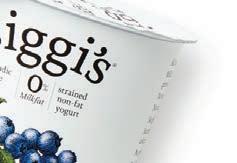



Innovation is flourishing in the plant-based world, with brands continuing to generate healthy, good-tasting meat- and dairy-free creations.
BY REBECCA HEATONThe numbers don’t lie: Plant-based food is a multibillion-dollar industry that isn’t slowing down. According to natural and organic products information provider SPINS, that number hit $4.2 billion at the end of 2018, and could reach $6 billion by the end of 2020. The NPD Group, another global information company, shares that more than 43 million Americans regularly use plant-based alternatives. One of the reasons: Plant-based options just keep getting better and more available. Here are a few to try.
DAIYA
Daiya Cheddar

Style Shreds
Dairy-free, made with tapioca flour, canola and coconut oils, plus pea protein and natural flavors. Gooey when melted!
TRY
TREELINE
Treenut Cheese

Herb-Garlic Flavor
Soft, Frenchstyle spread from cashews, lemon juice, scallions, herbs and L. acidophilus, a probiotic.
BARILLA
Red Lentil Rotini

No long ingredient list, made simply with red lentils—rich in iron, folate and protein. Certified non-GMO and gluten-free.
TRY
BANZA Penne

Protein- and fiberladen chickpeas are the main ingredient, with a touch of tapioca and pea protein.
PURE BLENDS
Avocado Oil
Plant-Based Butter
Avocado oil, with soybean, palm kernel and palm oils, plus natural flavors.

TRY
EARTH BALANCE

Original Buttery Spread
A blend of palm fruit, canola, soybean, flax and olive oils, with a dash of pea protein.
GRAB-AND-GO
In need of a nourishing plant-based pick-me-up for lunch or post-workout?
A protein heavy hitter can help you feel fuller, longer. Try Alpha Foods’ vegan Mexicali Burrito, loaded with 11 grams of plant protein from soy, plus dairy-free cheese, caramelized onions and spices.

FIELD ROAST

Italian Sausage
Like an old-country artisan sausage, but made with wheat gluten, eggplant, sweet peppers and spices.
TRY

The Beyond Burger
Made from pea protein and beets. Looks, cooks and tastes like beef; this burger bleeds “beet blood.”
‘MEATS’


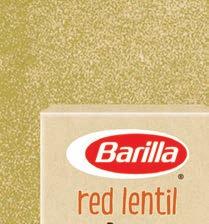







*Per 2oz. serving















FIND IT IN THE PASTA AISLE





There’s much to love about oatmeal. But if you’re in a flavor rut with your daily bowl, we hear you. “There is still a huge portion of the population that is not thinking outside the box when it comes to oatmeal,” says Samantha Stephens, owner of New York City–based OatMeals, offering 30 signature bowls and more than 80 toppings served for breakfast, lunch and dinner.

Oatmeal is heart-healthy, nutrient-dense, high in fiber and protein, and has tons of antioxidants, so it’s such a good choice to begin with, says Stephens, and it’s a perfect food for experimentation because it adapts well to almost any flavor.
How do you switch from ho-hum to palate pleaser? Try steel-cut oats—with a nutty, hearty flavor—and savory ingredients like cheese, oils, vegetables and eggs. “I’m also trying to get people to think about using oatmeal as a savory side dish with dinner,” Stephens says. Toast oats in olive oil with garlic or onion, and then cook in meat or vegetable stock for a tasty rice alternative.
FEBRUARY IS AMERICAN HEART MONTH, AND OATMEAL IS THE PERFECT FOOD FOR HEART HEALTH. NUMEROUS STUDIES SHOW THAT IT CAN REDUCE LDL AND TOTAL CHOLESTEROL (BY AS MUCH AS 5 TO 7 PERCENT), AND DECREASE RISK OF CORONARY HEART DISEASE.
TRY THESE
OATMEAL ADD-INS:
BREAKFAST
Fresh pineapple, dried mango, flaked coconut and coconut milk
Pumpkin puree swirl, pecans, brown sugar, pumpkin spice, whole milk
Dried pomegranate seeds, pistachios, honey, almond milk
Dates, pecans, granola, peanut butter, honey
Cinnamon-roasted sliced apples, sharp cheddar cheese, bacon, maple syrup, sea salt
Sun-dried tomato pesto, grated Parmesan, sea salt and fresh-ground black pepper
Poached egg, arugula, olive oil, grated monterey jack cheese, salt and pepper
Why—and how—you (yes, you ) should add this sea veggie to your weekly diet.
BY KELLEE KATAGISeaweed—also known by the more palatable moniker sea vegetables —is a catchall, nonscientific term for various kinds of multicellular ocean algae. These plants come in an array of shapes and sizes, from big and leathery to delicate and ferny. They also vary in color, which is the main way they’re classified.
The Major Players.
Edible seaweed species mostly fall into three categories: red, brown and green.
Red: There are 7,000-plus species of red algae, including the popular edibles nori (aka laver), which is used to wrap sushi and also sold dried, roasted and salted as a packaged snack; dulse, a snack food that looks like red-leaf lettuce when fresh and tastes a bit like bacon (!) when dried; and Irish moss, used to make the gelatinous food-binder carrageenan.
Brown: Up to 2,000 species make up this group, of which one of the best known is kelp. Popular types of kelp include kombu, arame and wakame, all of which are found in Asian soups, rice dishes and snack foods.
Green: This category is not strictly defined, but it includes chlorella, a freshwater algae often sold as a supplement, and sea lettuce, commonly found in Asian and northern European soups and salads.

Each seaweed species has a unique nutrient makeup, but all varieties tend to be high in fiber and provide some protein. Many contain various B vitamins, as well as minerals such as iodine, calcium and manganese.
A few studies suggest that seaweed consumption is a major reason Japanese women tend to have low breast-cancer rates, and other research hints that seaweed’s high fiber content can contribute to appetite control and weight loss. Another recent study found that seaweed can foster gut health by acting as a prebiotic for certain good gut bacteria.
But take note: For all these benefits, seaweed needs to be a major, regular part of your diet.
I’m vegan. Can I count on seaweed for vitamin B12?
A. No. Although some forms of seaweed contain substantial amounts of B12, it’s often in a form the body can’t use. And even when the form is bioavailable, processing can diminish B12 levels, making unfortified seaweed an unreliable source.
Asian and some coastal European cultures point the way: Stir seaweed into soups and casseroles, and serve it in salads or as a topping for rice. Eat it as a snack (generally after it’s been dried, roasted and salted), or try it in a creative dish, like Nori Pesto with Spiralized Cucumber (visit livenaturallymagazine.com for the recipe).
You might scrunch your nose up at seaweed’s unappetizing name, but you may want to unscrunch it long enough to consider what Asian cultures have known for centuries: This marine edible has a lot to offer.
Sports recovery foods and beverages get a lot of press—and a lot of real estate on store shelves. But what you eat pre-exercise can be just as important for your performance, in both the short and long term. Opt for one of these combinations before each workout to maximize your energy and performance. After all, if you’re at your best each time you exercise, over time you’ll see greater gains—and feel better along the way.
How long before a workout should I eat?
A study published in the Journal of Proteome Research found that cyclists improved their performance by 5 percent when they ate bananas before and during a 75-kilometer cycling session versus consuming water only. (Pears boosted performance by 3.3 percent; bananas’ more balanced ratio of glucose to fructose may explain the difference.) Pair a banana with peanut butter for a bit of protein, which will provide a more sustained release of energy from the banana’s carbs. 3

A great blend of carbs and protein, this snack also contains pro-muscle nutrients: whey protein in the yogurt and a compound called ursolic acid in the blueberries. A study published in Cell Metabolism found that ursolic acid may hinder muscle atrophy (apple skins are also high in ursolic acid).

*If you prefer a nondairy yogurt, check the label for the amount of protein. Some types, like Silk varieties, have more protein than others.

Wait, you say, that’s not a combo. Fine, add a touch of butter and cinnamon if you’d like, but this natural beauty is a perfect pre-workout food by itself. It’s high in carbs, provides several grams of protein and is a good source of potassium, which can be depleted through exercise.
2A. The answer can be different for each person depending on your digestive system, so start with 30 minutes in advance and see what works for you. Also, if you’re consuming high-fat or high-fiber foods— or a lot of liquids— you might want to skew earlier. Fat and fiber can make you feel sluggish, while fiber and fluids can interrupt your workout for a bathroom break.
How long before a workout should I drink water?
A. A study in the European Journal of Applied Physiology found that after subjects drank 10 ounces of water, the ingested water began to appear in their plasma and blood cells within five minutes, but their bodies didn’t completely absorb it for 75 to 120 minutes. Translation: Aim to hydrate one to two hours before exercise, depending on temperature conditions and other factors that can affect hydration.
Expert tips to keep your kitchen blades in tip-top shape.
Agood knife is one of the most important tools in the kitchen. The experts at Sasaki Masuta, a high-quality Japanese knife manufacturer, share the essentials on taking care of your kitchen warriors to keep them ready and able to prep any and all ingredients.
Look for a fully forged knife with a full-tang construction—the steel extends from the tip of the knife blade to the end of the handle—and a high-carbon Japanese or German steel blade. This makes for a stronger, better-balanced knife.
The higher the carbon content in the steel, the sharper the steel, as it will hold a longer- lasting edge.

Always cut your food on a plastic or wood cutting board with a nonslip grip to ensure it doesn’t move while cutting. Glass cutting boards are not recommended.
When cutting meat, a wood cutting board with a trench to capture the juices works best.
A plastic cutting board is great for cutting fruits and vegetables; the plastic will not dull the knife blade. Plus, it’s nonporous and dishwasher-safe.
Keeping your knives clean, sharp and safely stored to protect the blade (and your fingers) will prolong their lives.

TO CLEAN: .
Always hand-wash knives with warm, soapy water, and dry immediately with a clean, dry cloth. Never soak or submerge knives in water, and never put knives in the dishwasher (unless it’s clearly stated to do so on the packaging). In the dishwasher, knives can be damaged by acid, food remnants and chemicals; electrolytic oxidation caused by various metals in the same wash; prolonged high temperatures; and the drying cycle.
TO SHARPEN:
A sharp knife is a safe knife. Sharpen your knives regularly to ensure that they are ready for food preparation. There are many ways to sharpen a knife; choose the method you are most comfortable with: sharpening steel, handheld sharpener, whetstone or electric sharpener. Some knives even come with a sharpener built into their storage unit, such as a wood block or a plastic sheath.
TO STORE: .
Always store your knives in a safe place, such as a cutlery block, sheath, in-drawer organizer or magnetic bar. This will protect the blades—and your hands—from damage.
A go-to tool for peeling skin from fruits and vegetables. Forged from a single 67-layered Damascus high-carbon piece of Japanese AUS10 stainless steel. Features a full-tang blade running through the handle; triple riveting provides strength and stability. $49.99
Upgrade your next cup of java with these nutrient-heavy add-ins. Did we mention they’re delicious?
BY KELLEE KATAGIUnless you’re a black-coffee purist—or even if you are—consider livening up your next brew with healthier fare than sugar and traditional creamers. You’ll discover indulgent flavors, plus a bonus dash of nutrition. If any of these add-ins overpowers the coffee, first temper it with a splash of full-fat dairy (the latest research suggests this is healthier than lower-fat options) or nondairy milk alternatives—and then use a little less the next time.

Spices. Experiment to find your favorites. Popular choices include cinnamon, ginger or cardamom. If you’re adventurous, try turmeric, but save the nutmeg for your eggnog—it doesn’t mesh well with coffee’s bitter flavor. You can mix spices directly into brewed coffee or mix them in with the grounds before brewing.
Coconut. Try a bit of coconut oil, milk or even water. Each offer nutritional benefits and a taste of the tropics—just enough to get you island-dreaming midwinter.
To make every meal a slam dunk, don’t skip the warmup, says the Blue Jean Chef.
BY KELLEE KATAGISuccess in the kitchen often hinges not only on your skill while cooking, but also on the effort you put in beforehand. Here, cookbook author and QVC chef Meredith Laurence, aka the Blue Jean Chef, offers wisdom about planning ahead and making sure you have the right tools. Follow these tips and you’ll be on your way to achieving Laurence’s goal for everyone she coaches: that they’re as comfortable in their kitchen as they are in their blue jeans.
Have cookbooks and websites on hand that not only have recipes but also include technique and cooking tips to help the home cook succeed. For example, the Cook’s Illustrated series provides a solid foundation for any cook.
2 Gather the right equipment.
Extracts or essential oils. Swap out sugary syrups for a few flavorful drops of an extract—such as vanilla, almond or peppermint— or an ingestible essential oil.
Collagen. For a taste-free protein addition, stir in a spoonful of collagen powder. Look for the hydrolysate form to ensure that it will dissolve versus congeal. (Turn to “The Latest on Collagen” on page 62 for more about collagen’s benefits.)
Mushroom powder. If you don’t mind a bit of an earthy flavor, add some mushroom powder, which may strengthen your immune system and boost your energy with regular use.
Ghee or clarified butter. This secret has been out for a while now. Proponents like this mix-in for its rich texture and what many argue are healthy fats. (Check out “A Better Butter?” on page 22 for more about ghee.)
Start with a good knife. Laurence recommends German or Japanese stainless steel, and a full-tang blade, which means it’s one piece of metal that enters and extends to the end of the knife handle. Also, have small bowls ready to hold your ingredients, and get out the right pots and pans for your recipe.
3 Create a meal plan.
Every week, plan out your meals and put together a shopping list. As you’re planning, carefully read through recipes to check whether: 1) you’ll have enough time to make the recipe; 2) you have all the ingredients or you need to add some to the shopping list; and 3) you have all the necessary equipment. Also, try to use similar ingredients throughout the week. If you’re going to have chicken, roast a whole chicken and then use the leftovers in a salad the next day.
Before you start cooking, assemble all your measured ingredients, plus your necessary tools and equipment. It makes the cooking process more relaxing and fun, with less room for error.
Avoid microwave or oven splatter or dripping with a vented glass Cuchina Safe Lid. Available in 8-, 9- and 11-inch coverage; use the lid to cover bowls, mugs and cookware when reheating food and drinks. Dishwasher- and oven-safe up to 450 degrees. $19.99

Gadgets to make cooking a breeze.

Chef’n’s soft and grippable SleekStor Pinch + Pour Silicone Measuring Beakers make pouring ingredients easy and drip-free. Use to melt and drizzle butter (they’re microwave-safe), pour batter into muffin tins, and measure any liquids or dry ingredients for recipes. Set of three, with 1-, 2- and 4-cup capacities. Dishwasher-safe, too. $34.99

Don’t have enough pans or stovetop burners? Prep two things at once with a Masterpan 2-Section Skillet. Cook fish, meat or sausages on the ribbed grill side, veggies or eggs on the other. A heavy-gauge metallic base distributes heat evenly. Nonstick, PFOA-free and dishwasher-safe, with a detachable handle, making the pan oven-safe up to 350 degrees. $45

Whether you’re on a diet or making a recipe that calls for serving sizes or ingredients by weight, the Salter Touchless Tare Digital Kitchen Scale can help. Easily switch the digital display between pounds/ounces, grams, fluid ounces and milliliters. There’s even a function to zero out the weight of your bowl/container so you know exact ingredient weights. $29.99

The Spoon Buddy is a clever, multipurpose gadget. Keep counters clean by using it as a spoon rest that can be adhered via a suction base to a pot lid or countertop. Or turn it upside-down, and use it as a grip to open stubborn jars. Heat-resistant and dishwasher-safe. $9.99


Keep busy in a warm kitchen during the colder months with these four new cookbooks.
There are vegetarians. There are flexitarians. And now there are reducetarians, who are looking to reduce their consumption of meat, eggs and dairy. In The Reducetarian Cookbook (Center Street, 2018), authors Brian Kateman and Pat Crocker share 125 easy-to-prepare plantbased recipes. According to Kateman, eliminating at least 10 percent of the meat from our diets leads to health benefits, including possible weight loss and a healthier heart. Recipes run the gamut, from dishes like Rainbow Vegetable Soup to Vegan Cheesy Queso and Shakshuka-Style Tempeh.

In their new book Coconuts & Kettlebells (William Morrow, 2018), “WellFed Women” podcasters Noelle Tarr and Stefani Ruper have created a whole-body food and fitness plan that teaches women how to make educated decisions about food and managing health for the long term. Along with 75 recipes—like a RaspberryCoconut Smoothie Bowl, Cilantro-Lime Turkey Burgers, and Chicken and Sage Meatballs—Tarr and Ruper offer a four-week, 2,000-calories-a-day meal plan catered to your body’s needs, complemented by a fun fitness regimen.

Former Southern Living editor Julie Grimes learned her first lessons in economics and budgeting while working on her family farm, harvesting and selling homegrown veggies. “Making delicious, healthy, affordable meals for your family doesn’t require expensive ingredients,” she writes in her new cookbook, $10 Dinners (Oxmoor House, 2018). Grimes presents more than 100 meat, poultry, seafood and meatless recipes that serve four to eight, all with ingredients costing less than $10. There’s White Chicken Pizza for $6.05, Korean-Style Beef Tacos for $9.68, and Winter Squash and Chickpea Stew for $6.53.

To country-music icon
Martina McBride, cooking and singing aren’t all that different. “When I make something delicious, I want to share it, which is a lot like sharing my music with an audience,” she says. “Cooking is my love language.” In her cookbook Martina’s Kitchen Mix (Oxmoor House, 2018), McBride shares more than 150 of her favorite dishes, passed down from relatives or tested by McBride herself. Recipes include Shredded Brussels Sprouts Salad with Maple-Balsamic Vinaigrette, Grilled Sweet Peppers with Goat Cheese and Herbs, and Fresh Apple Cake with Homemade Caramel Sauce.
VISIT LIVENATURALLYMAGAZINE.COM FOR RECIPES FROM EACH OF THESE BOOKS, INCLUDING SHAKSHUKA-STYLE TEMPEH, RASPBERRY-COCONUT SMOOTHIE BOWL, WHITE CHICKEN PIZZA AND FRESH APPLE CAKE WITH HOMEMADE CARAMEL SAUCE.












“Winter is the time for comfort, for good food and warmth, for the touch of a friendly hand and for a talk beside the fire: it is the time for home.”
EDITH SITWELL
These flavorful dishes incorporate vegetables of the season to fill your tummy and tantalize your taste buds. TURN TO PAGE 38 FOR RECIPES.
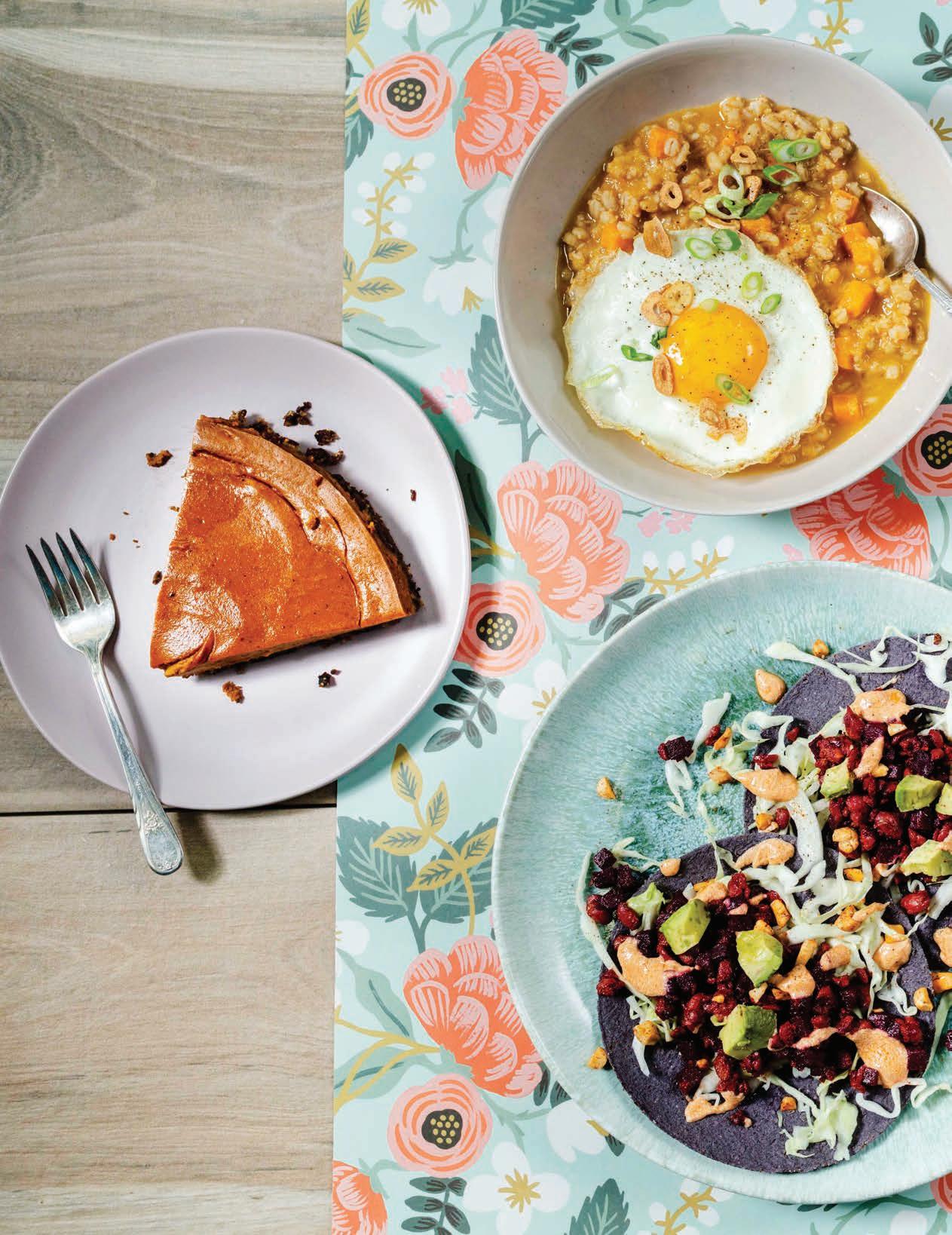
A mainstay of winter dishes, root vegetables are full of goodness.
BEETS: Sweet and earthy, beets contain antioxidants called betalains, which can help fight cancer and other degenerative diseases. They’re also rich in vitamins A, B and C as well as potassium.
CARROTS: These veggies are loaded with beta-carotene, which converts to vitamin A in the body. Vitamin A is essential for a strong
immune system and healthy eyes, skin and mucus membranes. Also full of vitamin C, cyanidins and lutein, which are all antioxidants.
SWEET POTATOES: A super source of beta-carotene, sweet potatoes are also host to a wealth of antioxidants and minerals, including manganese, copper, potassium and phosphorus.
According to Chinese medicine, winter is a time to slow down and eat warm, hearty meals to feed your kidneys, which in turn create nutrients for bone health. Foods of the season include root veggies, beans, nuts and seeds, grains, cabbage, apples and pears.

Brussels sprouts are a cruciferous vegetable related to cabbage, broccoli and cauliflower.
SERVES 8
1 tablespoon olive oil
¾ cup roasted pumpkin seeds, chopped
1 teaspoon fresh ginger, minced
1 teaspoon garlic powder
2 teaspoons tamari
1 teaspoon salt
4 ounces fresh butternut squash
2 cups red cabbage, shredded
1½ cups baby bella mushrooms
Peanut oil, as needed
8 (7-inch) egg roll wrappers
1 egg whisked, as needed for egg wash
SAUCE
¾ cup pineapple juice
1½ tablespoons cornstarch
¼ cup ketchup
¼ cup brown sugar
¼ cup rice wine vinegar
3 tablespoons tamari
1. Preheat oven to 375°. In a medium saucepan, heat olive oil and add pumpkin seeds, ginger, garlic powder, tamari and salt. Sauté until golden brown. Set aside, and let mixture cool.
2. Using a mandolin slicer, slice butternut squash into thin, julienned pieces. Lightly steam squash until slightly tender.
To make egg roll filling, combine squash, red cabbage and mushrooms with pumpkin seed mixture. Set aside.
3. While peanut oil is heating, divide filling into eight portions. Start forming egg rolls: Lay egg roll wrapper so one corner is facing you and opposite corner is facing away. Fill middle of wrapper with one portion of filling.
4. Use egg wash to wet all four corners of the wrapper. Fold corner closest to you toward the filling; bring corner on the left, and place on top of the first folded corner. Grab corner on the right, and fold to center, on top of existing folded corners. Follow with last corner, and seal egg roll. Continue with the rest of the filling until all rolls are made.
5. Once shaped, lay egg rolls onto a sheet pan. Brush lightly on all sides with peanut oil.
Place into oven, and bake until golden brown, about 30 minutes. Turn rolls over halfway.
6. For sauce: In a small bowl, mix pineapple juice and cornstarch; set aside. In a small saucepan over medium heat, combine ketchup, brown sugar, rice wine vinegar and tamari. Stir in pineapple mixture. Continue cooking until thickened, about 5 minutes.
PER SERVING: 50 CAL; 2G PROTEIN; 2.5G FAT; 7G CARB (4G SUGARS); 135MG SODIUM; 1G FIBER
SERVES 8
TOSTADA
2 tablespoons olive oil
2 cups fresh beets, medium diced
5 tablespoons chili powder
2 tablespoons garlic powder
2 tablespoons onion powder
2 tablespoons red pepper flakes
1 tablespoon cumin
1 tablespoon cocoa
Vegetable stock, as needed
1 pound tempeh, crumbled (2 ounces per tostada)
2 cups roasted cashews, chopped
2 teaspoons tamari
8 blue masa corn tortillas
2 cups green cabbage, shredded
2 avocados, sliced
Fresh lime wedges
CHIPOTLE TOFU AIOLI
8 ounces soft tofu
¾ cup canola oil
1 teaspoon onion powder
1 teaspoon garlic powder
2 ounces chipotle adobo, from can
1. In a medium skillet, heat olive oil. Sauté beets, chili powder, garlic powder, onion powder, red pepper flakes, cumin and cocoa. Add vegetable stock if mixture becomes too dry. Cook until tender. Add tempeh, cashews and tamari. Continue cooking until spices become fragrant.
2. To prepare aioli, blend together all ingredients until smooth.
3. Separate tostada mixture into eight portions. Build tostadas using warmed tortillas as your base, and build up filling. Garnish each with cabbage and avocado slices. Drizzle aioli over each, and finish with freshly squeezed lime juice.
PER SERVING: 330 CAL; 20G PROTEIN; 22G FAT; 19G CARB (4G SUGARS); 115MG SODIUM; 3G FIBER
SERVES 8
SALAD
Carrot
3 cups brussels sprouts; ends trimmed and waxy leaves removed, cut in halves and quarters
1 tablespoon olive oil, divided ½ teaspoon red pepper flakes
1 teaspoon rosemary, finely chopped
1 teaspoon thyme, finely chopped Salt, to taste
1 medium red bell pepper, julienned
1 medium Granny Smith apple, medium dice
½ cup toasted walnuts, divided ½ cup toasted pecans, divided
3 cups watercress
DRESSING
1 teaspoon grainy Dijon mustard
2 tablespoons apple cider vinegar
½ teaspoon maple syrup
¼ teaspoon red pepper flakes
1 teaspoon salt
¼ cup olive oil
1. Preheat oven to 400°. Toss brussels sprouts in ½ tablespoon olive oil, red pepper flakes, rosemary, thyme and a pinch of salt. Spread on a baking sheet; cook 20 minutes or until fork-tender. Cool, and cut into medium dice.
2. Toss bell pepper, remaining olive oil and a pinch of salt. Spread on baking sheet; cook 7 minutes.
3. In a small bowl, combine all dressing ingredients except oil.
Slowly pour in oil, whisking continuously to emulsify.
4. To build salad, combine brussels sprouts, ¾ of the apple, ¾ of the walnuts and ¾ of the pecans. Add dressing, and toss together. Add watercress, and toss again.
5. To serve, assemble on plates, and garnish with roasted red pepper and remainder of apples, walnuts and pecans. PER SERVING: 200 CAL; 3G PROTEIN; 18G FAT; 11G CARB (5G SUGARS); 270MG SODIUM; 3G FIBER
SERVES 8
CONGEE
2 tablespoons canola oil
2-inch knob ginger, minced
3 cloves garlic, minced
1¼ cups barley
3 quarts vegetable stock, room temperature
1 cup sweet potato, finely diced
GARNISH
¼ cup scallions, sliced
¼ cup fried garlic
1. Preheat oven to 400°. In a medium stockpot over medium heat, heat oil. Add ginger and garlic, stirring until fragrant. Add barley; stir to toast, about 5 minutes.
2. Add stock, and bring to a boil; then add sweet potato.
3. Reduce heat to low simmer. Cook 1½ to 2 hours, until rice is soft and porridge-like, stirring occasionally to prevent sticking.
4. While congee cooks, prepare garnish. Slice scallions. To fry garlic, thinly slice; cook in olive oil over medium heat until lightly browned.
5. To serve, top congee with fried garlic and scallions.
PER SERVING: 190 CAL; 4G PROTEIN; 4G FAT; 36G CARB (5G SUGARS); 400MG SODIUM; 6G FIBER
Live Naturally is excited to partner with Johnson & Wales University (JWU). Anderson
Hadley, Megan Fira, Chef Adam Sacks, Tracy Bui, Jesus Raya III and Nobuko Simoneaux (L to R) developed these recipes. Known as a recognized leader in culinary education, JWU is changing the way the world eats. For info, visit jwu.edu/denver.

made with Madagascar vanilla beans, local peaches, mouthwatering strawberries, wild Maine blueberries, or simply on its own as delicious plain yogurt.

Kite Hill blends its artisan almond milk with live active cultures to create the new gold-standard in plant-based yogurts.






















MAKE YOUR OWN BALSAMIC REDUCTION: Simmer 1 cup balsamic vinegar over medium heat for about 15 minutes, until slightly thickened and reduced in volume by at least half.
Any way you slice it, pizza is a quick and delicious platform to bring together an array of healthy toppings and flavors. Here are four easy, tasty creations. BY GENEVIEVE

Polenta is ground from dried yellow corn, and with simple preparation, makes an excellent gluten-free crust. Note: This recipe requires dry polenta rather than polenta in a tube. SERVES 3-4
1½ cups vegetable stock

¾ cup polenta
1 tablespoon olive oil

½ teaspoon salt
8 ounces bacon, ½-inch slices
1 medium red onion, ½-inch half-moon slices
6 ounces shredded mozzarella cheese (about 1½ cups)


2 tablespoons aged balsamic vinegar
Handful of arugula, for garnish
DIRECTIONS
1. Preheat oven to 450°. In a small pot, bring stock to a boil. Reduce heat to medium low; add polenta, olive oil and salt. Whisk continuously about 3 minutes, until polenta thickens and becomes difficult to whisk.
2. Pour polenta onto a warmed pizza stone or baking sheet lightly sprayed with oil of choice or brushed with melted butter. Using a rubber spatula, spread polenta so crust is about ¼-inch thick.
3. Place crust on lower oven rack, and bake 15 minutes, until slightly crisp. Reduce heat to 425°.
4. Meanwhile, heat a large sauté pan
DOLLover medium heat. Add bacon, and sauté until bacon begins to brown and fat renders, about 8 minutes. Using a slotted spoon, transfer to a paper towel–lined plate. Reserve bacon fat in pan.
5. Add onions to bacon fat, and cook over medium heat 7–8 minutes, until softened. Transfer to a paper towel–lined plate.
6. Top crust with mozzarella, bacon and onions. Bake about 8 minutes on top rack, until cheese is bubbling.
7. Drizzle with balsamic, and garnish with arugula.

Pesto can be made ahead and refrigerated for up to one week or frozen until ready to use. If you are looking to save time, a store-bought pesto is a great option. SERVES 3-4
PESTO
2 cups lightly packed chopped spinach
¾ cup lightly packed basil leaves
½ cup sunflower seeds
1⁄3 cup olive oil
¼ cup lemon juice
1 tablespoon lemon zest
¾ teaspoon salt
PIZZA
1 medium pizza crust (about 12 inches)
1 teaspoon olive oil
½ pound ground turkey
½ teaspoon fennel seeds
½ teaspoon salt
1⁄8 teaspoon red pepper flakes
½ cup crumbled feta
Pomegranate seeds, for garnish
1. Preheat oven to 400°. Add all pesto ingredients to a blender or small food processor. Blend on high until thoroughly combined. Season to taste.
2. If using raw dough, roll out thinly and place on a baking sheet. Prebake 10 minutes before adding toppings.
3. Heat a medium sauté pan over medium heat, and add olive oil, turkey, fennel, salt and red pepper flakes. Cook 5 minutes, until meat is no longer pink.
4. Spread a generous amount of pesto over pizza crust. Top with turkey and feta. Bake 10 minutes, until feta begins to brown and crust is cooked through.
5. Garnish pizza with pomegranate seeds.
PER SERVING: 548 CAL; 22G PROTEIN; 37G FAT; 35G CARB (2G SUGARS); 1,020MG SODIUM; 4G FIBER
WHISK EXTRA PESTO WITH OLIVE OIL AND APPLE CIDER VINEGAR FOR A DELICIOUS VINAIGRETTE.
Bursting with umami, this hearty mushroom pizza is an excellent vegetarian option. Any combination of wild mushrooms can be used in place of shiitakes. SERVES 3-4
6 ounces shiitake mushrooms, stems on, thinly sliced
6 ounces cremini mushrooms, stems removed, thinly sliced 5 tablespoons olive oil, divided ½ teaspoon salt
4 medium cloves garlic, minced Zest of 1 lemon
1 tablespoon lemon juice
1 tablespoon tamari
1 medium pizza crust (about 12 inches)
½ cup grated Parmesan
½ cup walnut halves
Parsley leaves, for garnish Honey, for drizzling
NO NEED TO REMOVE SHIITAKE STEMS; THE COOKING PROCESS WILL SOFTEN THE STEMS SUFFICIENTLY AND MAXIMIZE THIS FLAVORFUL MUSHROOM.
1. Preheat oven to 400°.
2. Heat a large sauté pan over medium heat, and add 4 tablespoons olive oil. Add mushrooms and salt, and sauté 5 minutes, until mushrooms soften. Stir in garlic, lemon zest, lemon juice and tamari. Cook 1 more minute. Set pan aside.
3. If using raw dough, roll out thinly and place on a baking sheet. Prebake 10 minutes before adding toppings.
4. Brush pizza crust with remaining 1 tablespoon olive oil. Top with mushrooms and Parmesan. Bake 10 minutes, until crust is golden and cooked through.
5. Meanwhile, heat a medium sauté pan over medium heat. Add walnuts, and toast 3–4 minutes, until lightly browned and fragrant, stirring continuously. Roughly chop.
6. Garnish pizza with toasted walnuts and parsley, and drizzle with a touch of honey.


Roasting fennel mellows its flavor, resulting in a mild sweetness. Make sure to remove core from fennel bulb before thinly slicing. SERVES 3-4
2 cups broccoli florets
2 cups thinly sliced fennel (about 1 medium bulb)
2 tablespoons olive oil
1 tablespoon lemon juice
½ teaspoon salt
Freshly ground pepper
1 medium pizza crust (about 12 inches)
½ cup red sauce
8 ounces fresh mozzarella
log, thick-sliced half-moons
½ cup sliced green olives
Red pepper flakes, for garnish
1. Preheat oven to 425°. In a medium bowl, toss broccoli, fennel, olive oil, lemon juice, salt and pepper. Place on a large baking sheet in a single layer. Roast 15 minutes, until vegetables begin to brown.
2. If using raw dough, roll out thinly and place on a baking sheet. Prebake 10 minutes before adding toppings.
3. Spread sauce over crust. Add roasted vegetables, and top with mozzarella and olives.
4. Bake 7–9 minutes, until cheese is bubbling.
5. Sprinkle with red pepper flakes to taste.
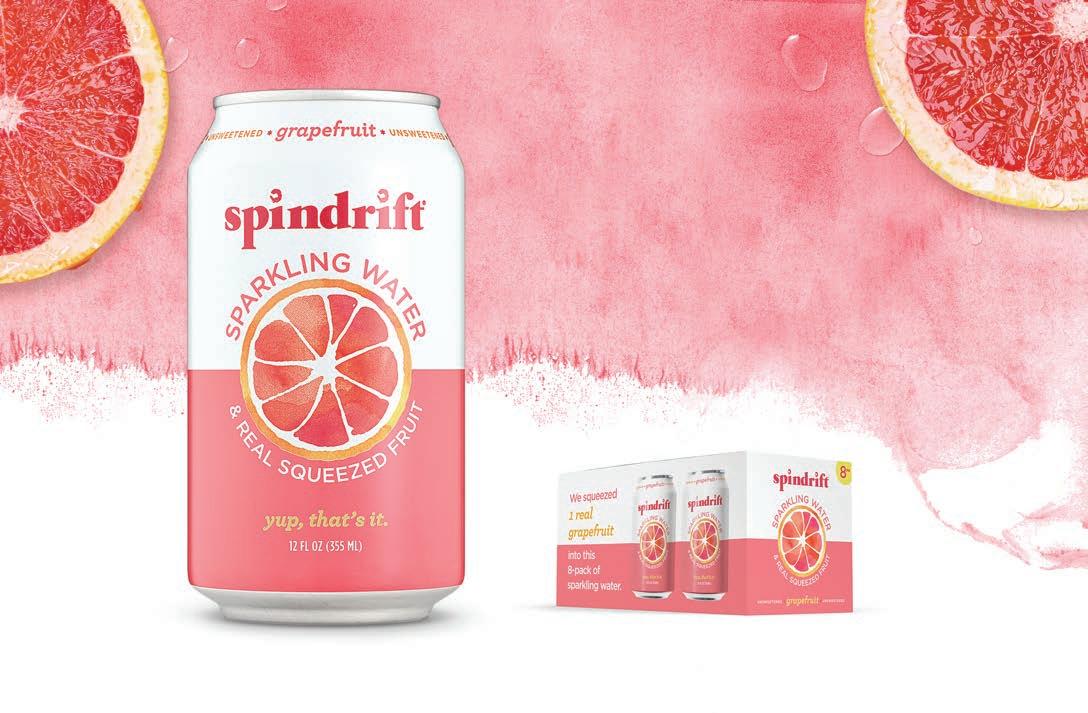






































































































The ketogenic diet (or keto, for short) is a lowcarb, high-fat way of eating that has been proven to lower blood sugar and insulin levels. The result is numerous health benefits, including weight loss, lower blood pressure and increased levels of healthy HDL cholesterol. The diet may also aid against diabetes, cancer, epilepsy and Alzheimer’s. Here are four recipes to get you started.
BY TAFFINY ELRODFull of fresh flavor and bright color, this delicious shrimp dish will feel like a ray of sunshine on a cold winter day. Serve the shrimp and veggies over cauliflower rice with a side of ripe avocado for a keto meal that will transport you to warmer climes.

SERVES 4
1 pound (about 20) jumbo shrimp; peeled and deveined, tails left on
1 teaspoon sea salt
1 teaspoon ground black pepper
¼–½ cup light olive oil or avocado oil
¼ cup seeded, diced red, yellow or orange bell pepper (a mix of all three colors looks beautiful)
2 tablespoons seeded, minced jalapeno or serrano pepper (optional)
1 cup cherry tomatoes, cut into quarters
½ cup sliced green onion, plus more for garnish
½ teaspoon each dried thyme and oregano
1 cup shrimp broth or vegetable broth
¼ cup fresh, minced cilantro or parsley

Zest and juice of
2 large limes
6 tablespoons unsalted butter, cubed
Sprigs of cilantro, for garnish
Steamed cauliflower
rice, avocado and lime wedges, optional
DON’T LET THE BUTTER AND OIL INTIMIDATE YOU. A KETOGENIC DIET DOESN’T FEAR HEALTHY FATS AND USES THEM TO REPLACE CARBOHYDRATES FOR ENERGY AND SATIETY.
1. Pat shrimp dry with a paper towel, and season with salt and pepper.
2. Heat a large skillet over medium-high heat. Add oil. Place shrimp in a single layer, working in two batches if necessary. Cook until they begin to brown. Turn them over, and cook another minute. Remove from pan, and set aside while you make the sauce.
3. Add peppers to pan; cook until they begin to soften. Add tomatoes, onions, thyme and oregano. If pan is too dry, add a splash of broth to moisten. Cook until tomatoes begin to soften and release their juice.
4. Add broth and simmer; cook until liquid is reduced by half.
5. Put shrimp back in pan, and heat until fully cooked. Add cilantro or parsley, lime zest and juice, and butter. Stir until butter is melted and mixed in; remove from heat immediately.
6. Garnish with fresh cilantro sprigs and sliced green onion, if desired.
7. Serve with cauliflower rice, a side of sliced avocado and lime wedges.
THE KEY TO TRULY CREAMY SCRAMBLED EGGS IS STARTING WITH WELL-BEATEN EGGS AND THEN COOKING THEM SLOWLY OVER LOW HEAT. GENTLY STIRRING WITH A SILICONE SPATULA OR WOODEN SPOON KEEPS THE EGGS SOFT AND CLOUDLIKE.

Eggs, butter and good cheese—long at the heart of many traditional cuisines—have been welcomed back to the breakfast table with a ketogenic diet. SERVES 4
BISCUITS
2 cups lightly packed almond flour
2 teaspoons baking powder
½ teaspoon fine sea salt
4 tablespoons (½ stick) cold, unsalted butter; cubed
2 large eggs, beaten
SCRAMBLED EGGS
8 large eggs
2 tablespoons heavy cream
2 tablespoons finely chopped chives
2 tablespoons finely chopped flat-leaf parsley
1 teaspoon fine sea salt
½ teaspoon ground black pepper
4 tablespoons unsalted butter
1 cup (4 ounces) grated
Gruyère or Swiss cheese
1. Preheat oven to 425°. Place almond flour, baking powder and sea salt in a food processor. Pulse to combine. Add butter, and pulse to cut into flour mixture until it looks like coarse sand.
2. Add the two beaten eggs to processor; blend until ingredients come together to form a soft dough.
3. Grease a 9-inch cake pan. Using an oiled ¼-cup measuring cup, scoop out 8 biscuits, shaping them slightly as you remove from the cup. Place them evenly on a greased pan.
4. Bake biscuits 15–20 minutes, until they are golden and firm to the touch.
5. While biscuits are baking, crack eggs into a large mixing bowl, and whisk
until whites and yolks are completely mixed. Stir in heavy cream, parsley, chives, salt and pepper.
6. Melt butter in a large, nonstick skillet over low heat. Pour eggs into pan, and gently stir with a silicone spatula or wooden spoon as eggs begin to set. Sprinkle cheese over the top, and gently stir it in. Continue to cook eggs over low heat until almost fully set but still slightly moist, 2–3 minutes.
7. Divide eggs among four plates, and serve with a hot biscuit. Or serve with a keto-friendly Mission Carb Balance Flour Tortilla.
PER SERVING: 772 CAL; 25G PROTEIN; 61G FAT; 34G CARB (1G SUGARS); 1324MG SODIUM; 1G FIBER

Instead of using starch or flour for thickening, this soup gets its body from pureed vegetables. It’s a simple and nutritious technique that keeps the carbs low. SERVES 4
2 tablespoons unsalted butter
4 cups sliced wild mushrooms
1½ teaspoons fine sea salt, divided
2 large leeks; white part only, chopped
2 large ribs celery, chopped
1 large shallot, chopped 4 skinless chicken thighs
1 teaspoon dried tarragon
1 teaspoon poultry seasoning or dried sage
½ teaspoon dried thyme
½ teaspoon ground black pepper
4 cups low-sodium chicken broth
½ cup sour cream
2 tablespoons finely chopped fresh parsley, for garnish
1. Melt butter in a large pot over medium heat. Add mushrooms, sprinkle with ½ teaspoon salt, and cook until mushrooms release their liquid and begin to cook dry.
2. Remove ½ cup of cooked mushrooms; reserve for later.
3. Add leeks, celery and shallot to pot; continue to cook over medium heat, until vegetables are soft and translucent.
4. Add chicken thighs, dried herbs, remaining 1 teaspoon salt, pepper and broth. Raise heat to high, cover, and bring to a boil.
5. Once soup has begun to boil, reduce heat and simmer covered
until chicken is completely tender and falling from the bone, 30–40 minutes. Remove chicken with a slotted spoon, and set aside to cool briefly.
6. With an immersion blender or regular blender, blend hot soup until completely smooth.
7. Pull chicken meat from bones, and shred into pieces. Return chicken and reserved mushrooms to pot, and heat soup to a simmer. Stir in sour cream and fresh parsley.
8. Divide among four bowls, and garnish with a dollop of sour cream, a slice or two of sautéed mushroom, and a sprig of fresh parsley, if desired.
PER SERVING: 244 CAL; 18G PROTEIN; 13G FAT; 16G CARB (4G SUGARS); 1,039MG SODIUM; 2G FIBER

This decadent chocolate dessert is light, refreshing and easy to make. It’s also dairy-, sugar- and egg-free. SERVES 6
PANNA COTTA
½ cup cold coconut milk
2½ teaspoons unflavored gelatin powder
1¾ cups (14-ounce can) coconut cream
3 tablespoons stevia-erythritol blend granulated sweetener*
1⁄8 teaspoon fine sea salt
5 ounces dark chocolate, chopped into small pieces
1 teaspoon pure vanilla extract
RASPBERRY SAUCE
1 pint raspberries, rinsed and dried
1 tablespoon stevia-erythritol blend granulated sweetener*
*If you don’t need this recipe to be completely sugar-free, you can substitute an equal amount of coconut sugar.
1. Lightly oil six small bowls, ramekins or teacups.
2. Pour cold coconut milk into a medium saucepan, and sprinkle gelatin over the top. Allow to sit 1 minute for gelatin to soften.
3. Add coconut cream, sweetener and salt, and place over medium heat. Stirring to dissolve the gelatin, sweetener and salt, bring mixture to a boil. When boil is reached, remove mixture from heat, and carefully add chocolate and vanilla extract.
4. Allow to sit until chocolate has melted; then whisk
together. Mixture should be smooth and glossy with no lumps.
5. Divide mixture among prepared dishes; loosely cover each with plastic wrap. Refrigerate until fully set, at least 4 hours, preferably overnight.
6. In a mixing bowl, crush half of the raspberries with a fork until mashed. Mix in sweetener; then gently fold in other half of the berries. Cover, and refrigerate until ready to serve.
7. To unmold panna cotta, run a thin, flexible knife
around edge of each dish; briefly dip outside of ramekins to just below the rim in very hot water. Place a small plate or saucer over top of panna cotta, and invert, shaking gently to release. To serve, drizzle a tablespoon of raspberry sauce over each panna cotta. Place a small plate or saucer over the top of the panna cotta and invert, shaking gently to release.
PER SERVING: 433 CAL; 6G PROTEIN; 37G FAT; 22G CARB (8G SUGARS); 51MG SODIUM; 8G FIBER
NUTRITIONAL VALUES CALCULATED AT NUTRITIONDATA.SELF.COM



































When your favorite foods leave your digestive tract feeling like it has one too many twists in it, smooth out the road with Chewable Papaya Enzyme from American Healt h. ® * Papaya Enzyme naturally aids in the breakdown of food into the component nutrients our bodies need, whether it’s protein for muscles, fat for fuel, or carbohydrates for energy * So go ahead and give your digestion some well-deserved help from the perfect “after meal” supplemen t® 100% Natural Papaya Enzyme from American Health!*





Available in select stores.



Dishes from the Land of Spices are a delectable combination of bold seasonings, creamy sauces and tangy heat.
BY REBECCA TREONThe cuisine of India may be the most diverse in the world, incorporating regional spices, vegetables, fruits and grains grown across the country, with roots millennia old. Indian food uses a range of flavors—sweet, sour, spicy—together in one dish, and there is as much variation in the regional cooking as in all of Europe combined, with spices as the common thread. The assortment of dishes reflects India’s diverse ethnicity and the religions practiced—Hindu, Buddhist and Jain communities are largely vegetarian.
India’s unique cookery evolved because the country was a central player in trading with Persian, Greek and Arab cultures. Portuguese traders in the 16th century introduced new-world foods like chiles, potatoes, tomatoes and squash, and English colonial rule later influenced flavors. Indian food is one of the most popular cuisines in the world and has shaped dishes from the Caribbean to Southeast Asia. With some 20 to 30 basic spices—like coriander, turmeric, ginger and cumin—appearing throughout many dishes and with different ways to use them all, Indian food can seem unfamiliar, exotic or intimidating.
“I think people are daunted by the perception that Indian cooking has so many ingredients, which is so not true—it can be accessible,” says Raghavan Iyer, author of six cookbooks and winner of an Emmy, two International Association of Culinary Professionals awards and, most recently, a James Beard award. “In my book Indian

Cooking Unfolded [Workman, 2013], each recipe is made with 10 ingredients or less to be prepared in half an hour or less.”
The book features 100 simple recipes that demystify Indian cooking for the home cook. “In my mind, it unfolds a cuisine that is 6,000 years old,” Iyer says. “When I teach the building blocks of Indian cooking, I’m teaching people to work with common ingredients that create and tease out flavors that are very complex, from working with no spice to maybe five spices in a dish.”

Iyer’s style of cooking is what he believes captures the essence of Indian cooking: to make do with what you have and use techniques that bring out the flavors. He says true Indian cuisine isn’t what we get in the Western world on the average lunch buffet, and that most restaurants offer a very myopic vision. “I’ve always said the true beauty of Indian food is what you’re getting served in home kitchens. And I think once you understand that it’s not rocket science, once you understand the building blocks, you’ll walk away with the subtleties and intricacy that is going to showcase Indian home cooking and make your food shine.”
According to Iyer, all the ingredients for recipes in his book can be found in a regular grocery store—no need to seek them out at an Indian or specialty shop. He believes closely reading the recipe steps—and understanding what each step is teaching—is the key to success, no matter what type of cuisine. It’s that concept that allows cooks to master a recipe. “It’s the knowledge and details of extracting the multiplicity of flavors—that’s the backbone of Indian cooking.”
While creating this recipe, I happened to catch Patti LaBelle belting out “Lady Marmalade” in her moonlike, alien getup, gyrating suggestively, wondering in French if I wanted to sleep with her this evening (“Voulez-vous coucher avec moi ce soir?”). Well, tempting as that may be, my hands were busy stirring a pan with crisp-tender unripe mango, puckered with natural sourness and balanced with a smothering of sweet sugar, blood-pumping cayenne and sensuous cardamom. I had plans for that evening that only involved my very own Lady Mango Marmalade—addictively hot, pleasingly sweet, with just the right touch of acid.
MAKES ABOUT 2 CUPS
1 pound unripe mango
1 cup granulated sugar
¼ cup cider vinegar
2 tablespoons ground red pepper (cayenne)
½ teaspoon ground cardamom
1. Peel the mango (you may need more than one) with a potato peeler. Using the large holes of a box grater or a mandoline with the shredding attachment in place, shred the mango on all sides as close as you can get to the pit without shaving the large seed. You should end up with about 4 cups of shreds.
2. Place the mango shreds in a medium-size saucepan and stir in the sugar, vinegar, cayenne, and cardamom. Let the sugar-studded shreds come to a boil over medium-high heat. Boil the mango
mixture, uncovered, stirring it occasionally. Once the liquid starts to evaporate, after 8 to 10 minutes, reduce the heat to medium-low and continue simmering, uncovered, stirring occasionally, until the sugar starts to caramelize, and look bubbly with a gorgeous reddish-brown luster and very much jamlike, 10 to 15 minutes. Remove the marmalade from the heat and let it cool.
3. Once cool, store the marmalade in a glass container (because then you can look at it and marvel at its beauty) in the refrigerator for up to a month. Whenever you wish to use the marmalade, let it come to room temperature so it spreads easily. A quick zap in the microwave or immersing the jar in hot water will expedite that.


when your wizened aunt told you to “trust your gut,” science was actually on her side. A plethora of new research shows that the health of your digestive tract significantly affects your whole body, from your brain on down. If you sometimes feel like your tummy is talking to you, you may be right.
If your belly is so wise, that means it’s important to keep it in good shape. Central to gut health are probiotic bacteria, which have made plenty of headlines in recent years. “Probiotics are live bacteria or microbes that interact with your digestive system,” says Kirsten Shockey, author of Fermented Vegetables and Fiery Ferments (Storey, 2014 and 2017). “We need them in our digestive system for it to function properly.”

The bacteria, yeasts and other organisms that make up what’s known as the microbiome help the small and large intestines process food. They also keep out the bad critters that can cause a host of problems, from digestive issues to short-term and chronic illnesses. “The microbiome is the safeguard of everything,” says Dr. Keith Wallace, author of Gut Crisis (Dharma, 2017).
Humans evolved along with these microbes because the bacteria were present in the fresh and fermented foods that were a regular part of people’s diets. “In the last 50 to 75 years, food has taken a sharp turn away from that,” says Shockey. “Most of the food is very processed and sterile and dead, so our bodies are not getting this regular influx of live new probiotic microbes.”
The good news is that reseeding probiotic microbes in your gut is relatively easy—and getting easier all the time. Grocery stores are beginning to carry a wider array of foods that are full of beneficial bacteria. For people who don’t want to add products like yogurt and sauerkraut to their everyday diet, there are numerous supplements that provide a dose of the microbes your body needs to thrive.
Although researchers have always known that probiotics were good for the gut, they’re increasingly discovering that probiotics help with more than an upset stomach. “We’re seeing these very broad impacts throughout the body that aren’t associated with the digestive tract, which shows how important [they are] in someone’s overall health,” says Chris Oswald, D.C., L.N., C.N.S., manager of education content for supplement company Nature’s Way.
Data show a connection between a healthy gut and issues such as skin health, metabolic health and a robust immune system. “We know there are certain, very specific probiotic strains that have an impact on the brain and how the body deals with stress or creates more resiliency to the stress of modern-day life,” says Oswald. This has been dubbed the gut-brain axis.
It’s even possible that your digestive system acts as a sort of second brain. “Suddenly the gut is this major player
These good-for-you organisms are VIPs in terms of gut health and overall well-being. Fortunately, it’s easier than ever to attain these beneficial bacteria through a growing array of healthy foods and natural supplements available at your local store.
BY SOPHIA M c DONALD
in moods, anxiety, depression and neurological disorders,” says Wallace. “There’s speculation, but with good basis to it, that if you have a craving for a certain food, it doesn’t come from your brain. It comes from your gut.” When yeasts and other bad microbes take up residence in the intestines because there aren’t enough beneficial microbes to fight them off, they can actually produce neurotransmitters and hormones that cause those cravings. “They can short-circuit everything and get what they want,” adds Wallace.
Probiotic microbes need to be replenished regularly. One of the best ways to get beneficial bacteria into your belly is to eat fermented foods, such as sauerkraut, kimchi, yogurt, lacto-fermented pickles, raw cheese, miso and natto, a fermented soybean product common in Japan.
Probiotics can also be consumed in drinks such as kefir and kombucha. A number of companies now press and bottle juices from fermented foods or add probiotic supplements to tonics and flavored waters.

Shockey notes that canning and heating probiotic foods will kill the bacteria. For example, even though sourdough bread is fermented, and the microbes have transformed the ingredients into a more digestible product, it doesn’t contain live probiotics because it’s been cooked. The best place to find probiotic-rich sauerkraut, juices and other foods is the refrigerated section of the grocery store.
The difference between getting probiotics from food instead of supplements is that pills typically contain only a few specific strains of bacteria. “With the live foods you’re getting a broadcast of all kinds of different probiotic bacteria and enzymes,” Shockey says.
It’s also possible to refresh the probiotics in your system by taking supplements. One of the things longtime enthusiasts may have noticed is that companies now offer extra-strength formulas. “Very quickly we moved from 1 billion bug counts (CFUs) up to 10 billion and 30 billion. Now up to 50 billion is very common,” says Dan Feldkamp with Feldkamp Marketing, a consumer products agency that works exclusively with Kroger and its network of grocery stores.
Does the dose really make a difference? Wallace points out that one of the challenges with probiotic supplements is that the bacteria have to be able to survive the stomach’s harsh acids before they reach the large and small intestines. Having a larger quantity of microbes (as well as higher-quality organisms that can stay alive as they travel through the body) increases the chance that more will reach their final destination.
Oswald says some research shows that extra-strength probiotics can be beneficial. The nuance is that it’s essential to get a bigger dose of the right microbes. There are millions of different strains of probiotic bacteria, and they don’t all offer the same benefits. For that reason, it’s important to work with your doctor to be clear what type of bacteria you
need if you’re trying to address a particular problem.

Like any living creature, probiotic bacteria have been assigned a genus and species. But they also have a strain, and that’s what people should be paying attention to when they read labels. “The strain is always that collection of letters and numbers after these big words that most people can’t pronounce,” says Oswald. The strain, not the genus and species, is what’s tied to the results described on the packaging. A pharmacist or medical professional can help.
As scientists dial down the specific characteristics of different strains, they can create supplements that benefit certain groups. One of the most popular subcategories right now is probiotics for women. The goal of formulas high in Lactobacillus acidophilus (La-14) and Lactobacillus rhamnosus (HN001) is to decrease the likelihood of urinary tract and yeast infections. “When you take them orally there’s an impact on the vaginal flora,” says Oswald. “When you get it in the right balance, it maintains proper pH and balance. When that gets out of balance, it opens up the possibility of challenges.” (He emphasizes that these formulations are for preventing, not treating, these conditions.)
There are also probiotic supplements made specifically for seniors. As humans age, the natural presence of Bifidobacterium microbes in the gut begins to drop, Oswald says. As this happens, many adults begin to experience problems with regularity. Adding these bacteria back can prop up the population. (TOP):
CFU stands for colony-forming unit, which refers to the number of live and active micro-organisms that can be found in each serving of a probiotic.
It’s not a typo— prebiotics are a similar yet different category to pay attention to. Simply put, prebiotics are fiber-rich materials that provide food for the good bacteria in your gut. Think of them as the fuel that keeps your microbiome strong and healthy.
All vegetables contain a certain level of prebiotics, according to Shockey. The ones with the highest natural doses are onions and Jerusalem artichokes (also called sunchokes). Both are rich in inulin, a plantbased soluble fiber.
To kill two birds with one stone, ferment your veggies before piling them on your plate. “When you eat fermented vegetables, a lot of the time you’re getting prebiotics and probiotics in the same bite,” Shockey says.


Prebiotic supplements are also available at the grocery store. They typically come in powder form and must be dissolved in water or another liquid. If that isn’t appealing, “we’re seeing a lot of products that are a combination of prebiotics and probiotics,” says Feldkamp.





















 BY KELLEE KATAGI
BY KELLEE KATAGI


Moringa is a tree native to tropical and subtropical regions of Asia and Africa, although the primary species used for supplements (Moringa oleifera) hails from the Himalayan foothills. Its aliases include “drumstick tree,” based on the shape of its seed pods, and “horseradish tree,” for the taste of its root when ground. However, most moringa supplements come from the plant’s leaves.
Moringa helps with managing diabetes, obesity, inflammation and asthma; liver health; breastmilk production; and hormone balance.
Well-designed human studies of moringa are too sparse to definitively claim therapeutic benefits. But results of the few studies that do exist—combined with a larger pool of animal and in vivo research, plus anecdotal evidence from centuries of use—are promising. For example, animal studies, such as one published in 2012 in Molecular Nutrition and Food Research, consistently suggest moringa effectively battles insulin resistance and weight gain. At least one human study produced similar results.


Supplements primarily appear in powder or liquid extract form. The powder can be added to smoothies (expect a grassy or even radish-like flavor) or other beverages (but avoid heating it, which may diminish nutrients), or eaten directly (place under your tongue for quick absorption). The extract can also be placed under the tongue or added to a beverage.
Moringa leaves are high in iron, vitamins A and C, some B vitamins, magnesium and more, but concentrations in actual products vary widely, depending on the plant’s source and the product’s production process. Select reputable brands, and check labels before you buy.
Let these natural remedies stimulate your body’s fuel-burning capabilities when a little extra help is needed.
BY NANCY COULTER-PARKEREvery day, the body’s metabolism works diligently to convert food to energy. Some people need a lot of nourishment to keep their internal engines going, while others have a very slow metabolism, which requires consuming fewer calories to maintain a healthy weight. A slow metabolism can be a sign of a body running very efficiently, but it can also signal an underlying condition causing fatigue and diminished mental clarity. Not only can the body’s metabolic rate be altered by weight loss and frequent dieting, but it can also shift with age and medications. A sluggish thyroid could also be responsible.
“As naturopath doctors, we are always really intrigued at finding the cause as to why someone’s metabolism may not be as robust as it should be,” says Micah Allen, N.D., owner of Essential Natural Health in Richmond, Virginia. Allen, also a licensed acupuncturist, says thyroid dysfunction, autoimmune issues, blood sugar levels and metabolic syndrome—a precursor to diabetes—can all influence metabolism.
Eating a balanced diet (with lots of protein), exercising regularly, hydrating properly and getting enough sleep are all key to maintaining a healthy metabolism, but here are some natural remedies for an extra fuel-burning nudge, if needed.
Our bodies naturally produce coenzyme Q10 (or CoQ10), which creates energy on a cellular level, speeds up metabolism, regulates lipids, and fends off oxidative stress and fatigue. It’s particularly abundant in muscles, including the heart. When we are deficient, our metabolism can slow down, and we may feel sluggish. Also, studies show that when statin drugs are taken to lower bad cholesterol, the drugs also block production of CoQ10. It’s something to think about, considering that 28 percent of Americans over age 40 are on statin medications.
Doctors usually recommend CoQ10 in the form of ubiquinol because it is easier to absorb. A 100 mg dose is suggested for maintenance; consult with your doctor to confirm the best dose.
Yes, the trusty cold fighter that is great for immune-system support can also accelerate your metabolism by fighting off oxidative stress. This can particularly help older people, as a study conducted

at the University of Colorado Boulder discovered. Researchers noted that the body produces ample antioxidants in younger people, but with age this production diminishes, causing more oxidative stress and damage to cells, which in turn can reduce resting metabolism, especially in older adults, researchers believe. The study found that when adults ages 60 to 74 received vitamin C injections, their resting metabolism increased on average by almost 100 calories per day.
Vitamin C has also been shown to boost fat burning and regulate glucose metabolism and blood sugar levels by helping to shuttle glucose into cells to be used as fuel. This glucose regulation is important for diabetics, for whom too much glucose in the bloodstream can damage organs and blood vessels. The body needs vitamin C to produce sufficient amounts of L-carnitine, an amino acid that has also been shown to enhance metabolism. A recommended dose is 100 to 200 mg each day.
This powerful antioxidant, which is rich in anthocyanins—the dark pigments found in fruits such as raspberries or blueberries—not only fights off cell-damaging free radicals, but has also been shown to increase weight loss and reduce blood sugar levels. It encourages the production of the protein hormone adiponectin, which regulates fat cells and can improve metabolism while influencing the rate at which your body breaks down fat.
Although more research is needed to understand long-term benefits of ALA on weight management, studies have shown it to promote weight loss compared with placebos. A recent study conducted in Spain and published in the journal Obesity indicated that ALA may raise metabolism, promote the burning of fat as energy and encourage reduced food intake. The body can produce ALA naturally— it does so inside the mitochondria, the cell hub where it helps enzymes transform nutrients into energy. But the body is capable of producing only small amounts. Likewise, it’s hard to get a larger dose through food. This is why supplementation—300 mg each day—is recommended.
Frequently lauded for its health benefits, green tea contains catechins, natural antioxidants that thwart cell damage. One type of catechin in particular, epigallocatechin gallate (EGCG), is known to increase metabolism. It does so in part by inhibiting the enzyme that breaks down the fat-burning hormone norepinephrine. When this happens, more norepinephrine can be produced, resulting in greater fat breakdown. Add this to green tea’s caffeine content, which is lower than coffee but still significant, and green tea is at the ready to jump-start metabolism.

In a 2017 research review, it was found that daily consumption of green tea with doses of EGCG between 100 and 460 mg can reduce body fat and body weight, especially when taken for periods of 12 weeks or longer. In addition, daily use of caffeine in doses between 80 and 300 mg has been shown to stimulate EGCG’s metabolism-boosting effects. When a lesser amount of caffeine was taken, the results were not as pronounced.
Certain foods are known to stimulate metabolism. Chile peppers or hot peppers are a member of the capsicum family and contain both capsinoids, including dihydrocapsiate and capsaicin, the oily compound found in the membrane surrounding the seeds. The latter is what gives peppers their heat or spicy flavor. Research has shown dihydrocapsiate and capsaicin to increase metabolic rates modestly. Capsaicin also has been studied for its ability to use heat to spur metabolism and burn fat. In this capacity, the online journal Open Heart outlined that capsaicin has been shown to modestly enhance energy expenditure, while boosting fat oxidation and diminishing appetite. Although peppers do give your metabolism a lift, supplementation is necessary to maintain the increase, because you would have to eat peppers daily to sustain these effects.


Read on for the most recent intel on this multibenefit supplement.
BY KELLEE KATAGICollagen is our body’s most abundant protein. But the science surrounding it is still in process—especially when it comes to supplements. Preliminary research suggests that collagen supplements may improve joint and bone health; skin, hair and nail quality; and more. Here are a few of the most current findings regarding this popular nutrient.
When stocking up on collagen, the source matters. One of our top picks: NeoCell, which has been in the collagen business since 1998. Try its Super Collagen Powder or, if you prefer tablets, opt for Super Collagen+C. The added vitamin C contributes to healthy, beautiful skin.
A recent study by Korean and Japanese researchers, published in Nutrients, found that a collagen supplement may lead to better skin health. For 12 weeks, 64 women were given either a daily oral collagen peptide supplement or a placebo; those who took collagen experienced improvement in markers of skin hydration, elasticity and wrinkling compared with the placebo group. None of the participants reported any adverse effects.
The research on this is too new to be definitive, but some evidence suggests that collagen could promote better sleep if taken about one hour before bedtime. Numerous studies show that taking 3 grams of glycine—an amino acid that tends to be abundant in collagen—before you head to bed can lead to deeper, more restful sleep. Be sure to check your supplement to see if it has enough glycine to be effective.
A 2018 study at the Australian Institute of Sport concluded that collagen supplements provide higher and more reliable levels of amino acids than bone broth—a popular collagen source—whether prepared commercially or at home. Home bone-broth concoctions tended to have higher amino-acid levels than store-bought versions, but both fell short of levels found in various collagen supplements.
Oral collagen supplements may help normalize fasting blood-glucose levels in people with type 2 diabetes and reduce the levels of pharmaceutical drugs they need, according to a 2018 study published in the Journal of Clinical Nutrition and Food Science. The double-blind, randomized research examined 60 participants over 12 weeks who took fish collagen peptides and found that they improved blood-sugar markers as well as or better than those taking diabetes medication.








This “fruit of the gods” enhances both sweet and savory recipes.
BY DINA DELEASA-GONSARAs the weather grows colder, seasonal produce options diminish. The persimmon is an underrated early-winter fruit that looks like a tomato but tastes much sweeter. There are two main varieties: fuyu and hachiya; fuyus are mildly sweet and the most versatile.

YIELDS 7 TO 8 PIES
DOUGH
2 cups all-purpose flour
Pinch of salt
2 teaspoons sugar
¼ cup plus 2 tablespoons solid vegetable shortening
¼ cup plus 2 tablespoons butter
3–4 tablespoons ice water
PERSIMMON MIXTURE
2 cups persimmon, cubed
2 tablespoons honey
1 teaspoon brown sugar
1 tablespoon maple syrup
1⁄8 teaspoon kosher salt
1⁄8 teaspoon pepper
1 teaspoon smoked paprika
½ cup goat cheese
1 tablespoon chives, chopped
1 egg, for dough wash
Granulated sugar, for garnish
Dina Deleasa-Gonsar loves to create recipes and, in particular, experiment with ingredients. See more of her creations at dishitgirl.com.
1. Sift flour, salt and sugar into a mixing bowl. Add shortening and butter; work in with your hands until mixture resembles coarse crumbs. Add water, 1 tablespoon at a time; work in with your hands to a smooth dough. Form into a disk; wrap in plastic wrap. Refrigerate at least 30 minutes.
2. Preheat oven to 375°. In a large bowl, combine persimmon, honey, brown sugar, maple syrup, salt, pepper and paprika. Let fruit sit and soften 15 minutes.
3. Drain persimmon mixture through a fine mesh sieve into a smaller bowl. Reserve liquid.
4. Place drained persimmons into a medium-sized bowl. Add goat cheese and chives to persimmon mixture, along with 5-6 tablespoons reserved liquid. Mix together gently.
PERSIMMONS ARE FULL OF ANTIOXIDANTS, VITAMIN A AND MANGANESE, AND ARE RICH IN FIBER.
5. To assemble, roll out your dough to about 1⁄8 -inch thickness on a lightly floured work surface. Using cutter of your choice (I used the round opening of a mason jar), cut dough out to an even number of pieces (14-16). Lay cut dough on a parchment-lined baking sheet; chill in fridge 5–10 minutes.
6. Whisk egg in a small bowl to use as a wash. Remove dough from refrigerator, and on 7-8 pieces place a heaping tablespoon of filling in center of dough. Then place second half of pieces on top of each with filling. Seal by pressing edges with tines of a fork. Cut vent holes in tops. Brush with egg wash, and sprinkle with sugar.
7. Bake 15–20 minutes, until tops start turning golden brown.




